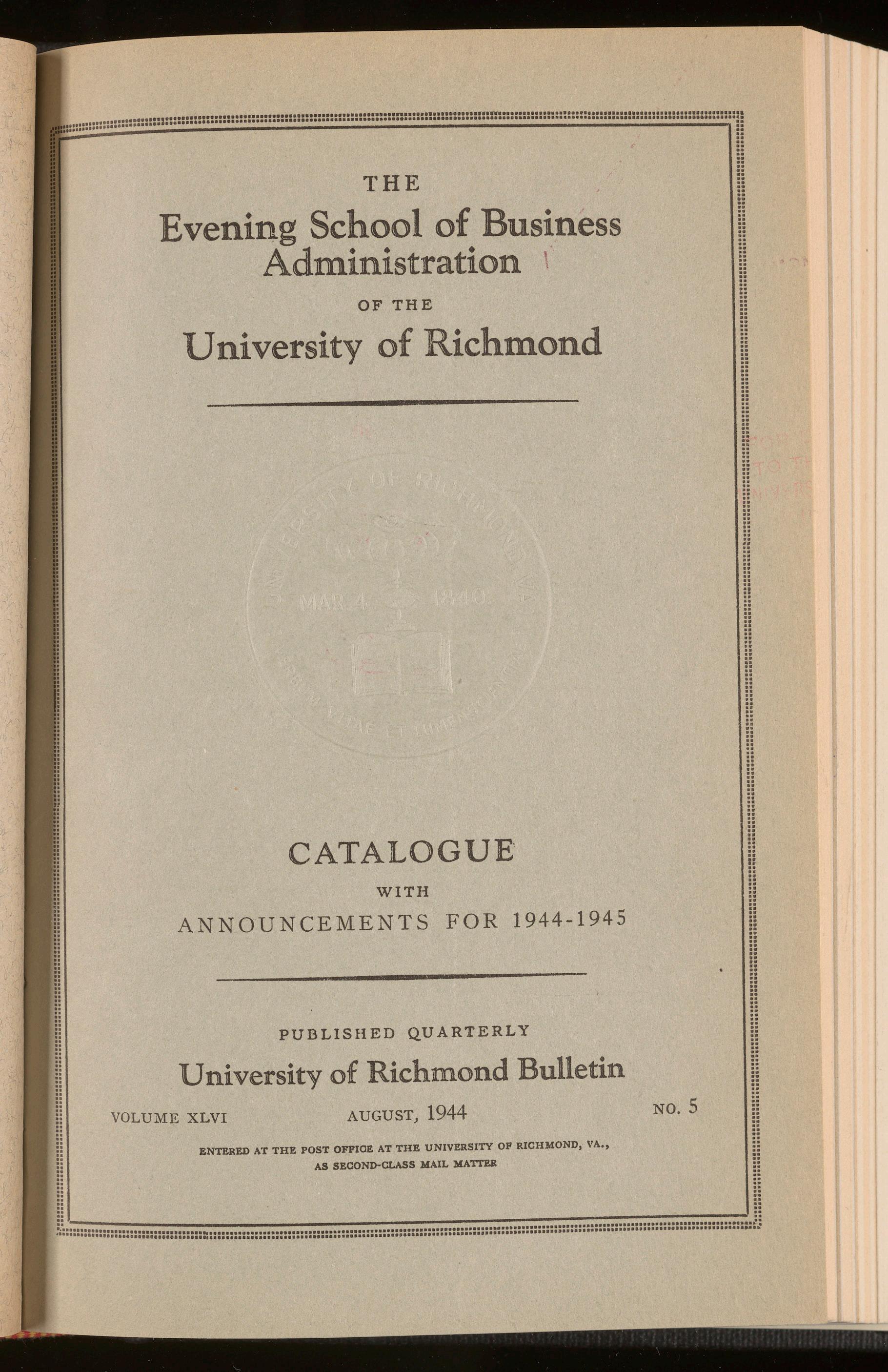
University of Richmond


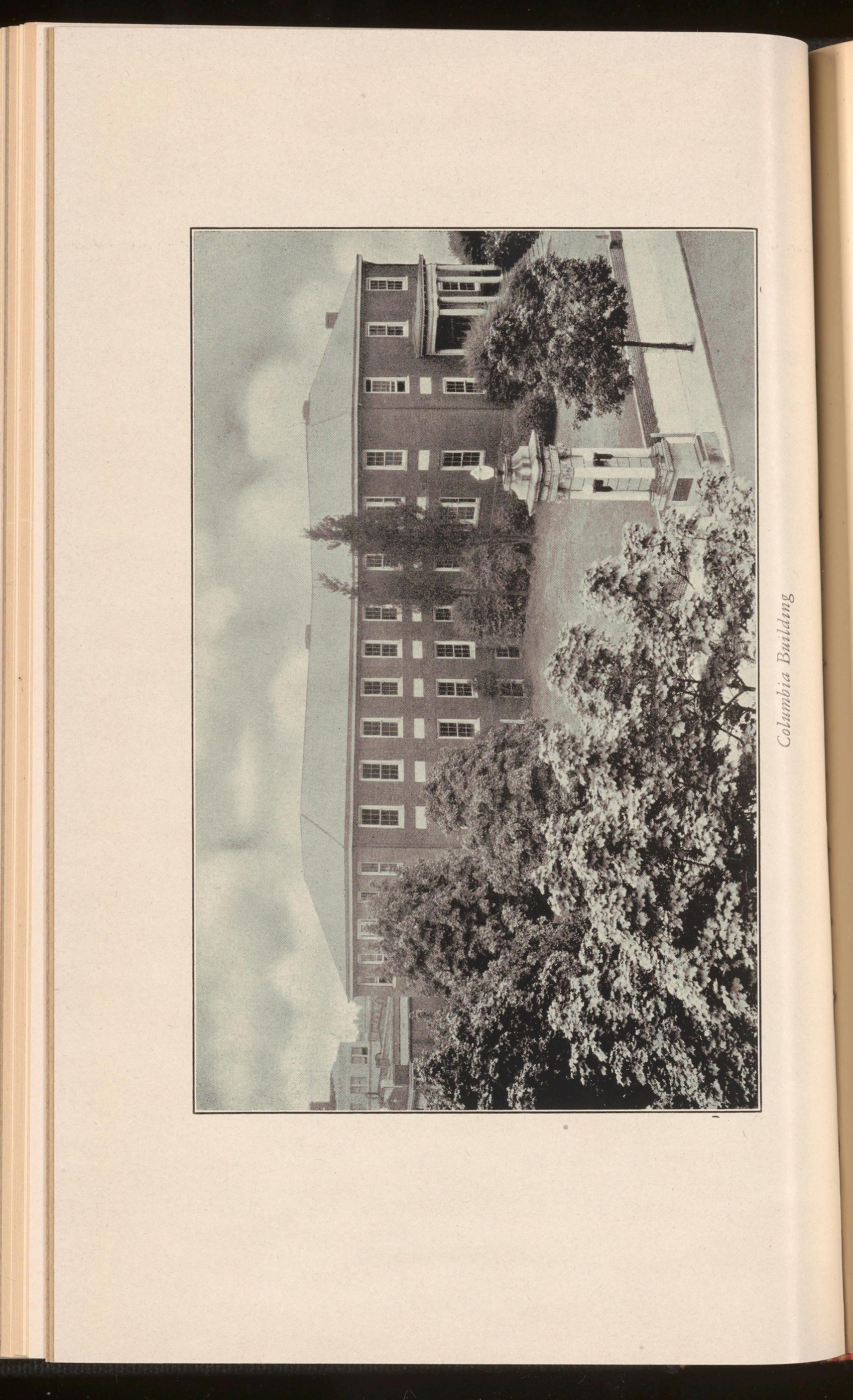





WI TH ANNOUNCEMENTS FOR 1944-1945
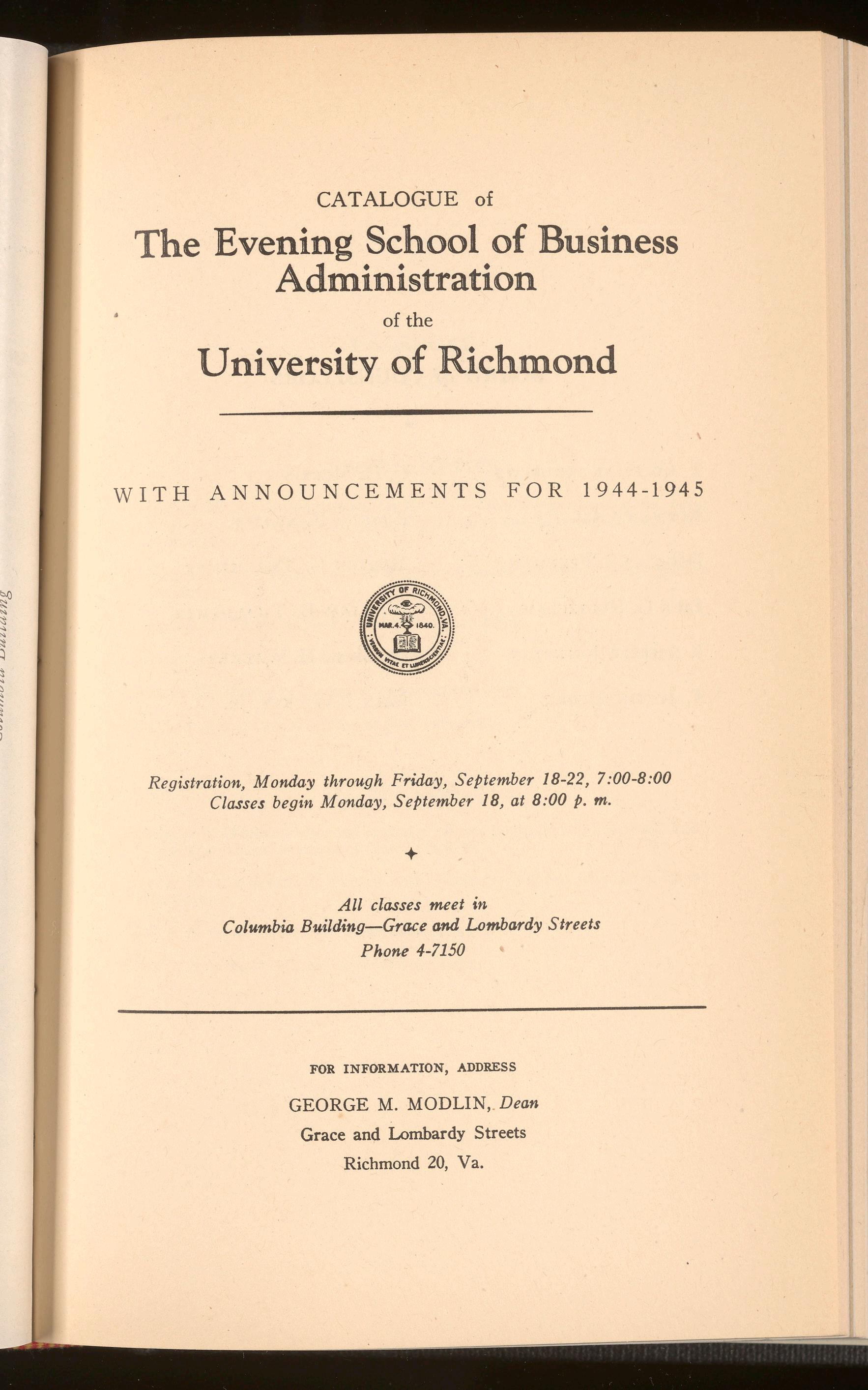
Registration, Monday through Friday, September 18-22, 7:00-8:00 Classes begin Monday, September 18, at 8:00 p. m.
All classes meet in Columbia Building-Grace and Lombardy Streets Phone 4-7150
FOR INFORMATION, ADDRESS
GEORGE M. MODLIN, Dean Grace and Lombardy Streets Richmond 20, Va.
T. COLEMAN ANDREWS
NORMAN CALL
DOUGLAS s. FREEMAN
JACK G. HOLTZCLAW
J. AMBLER JOHNSTON
T. JUSTIN MOORE
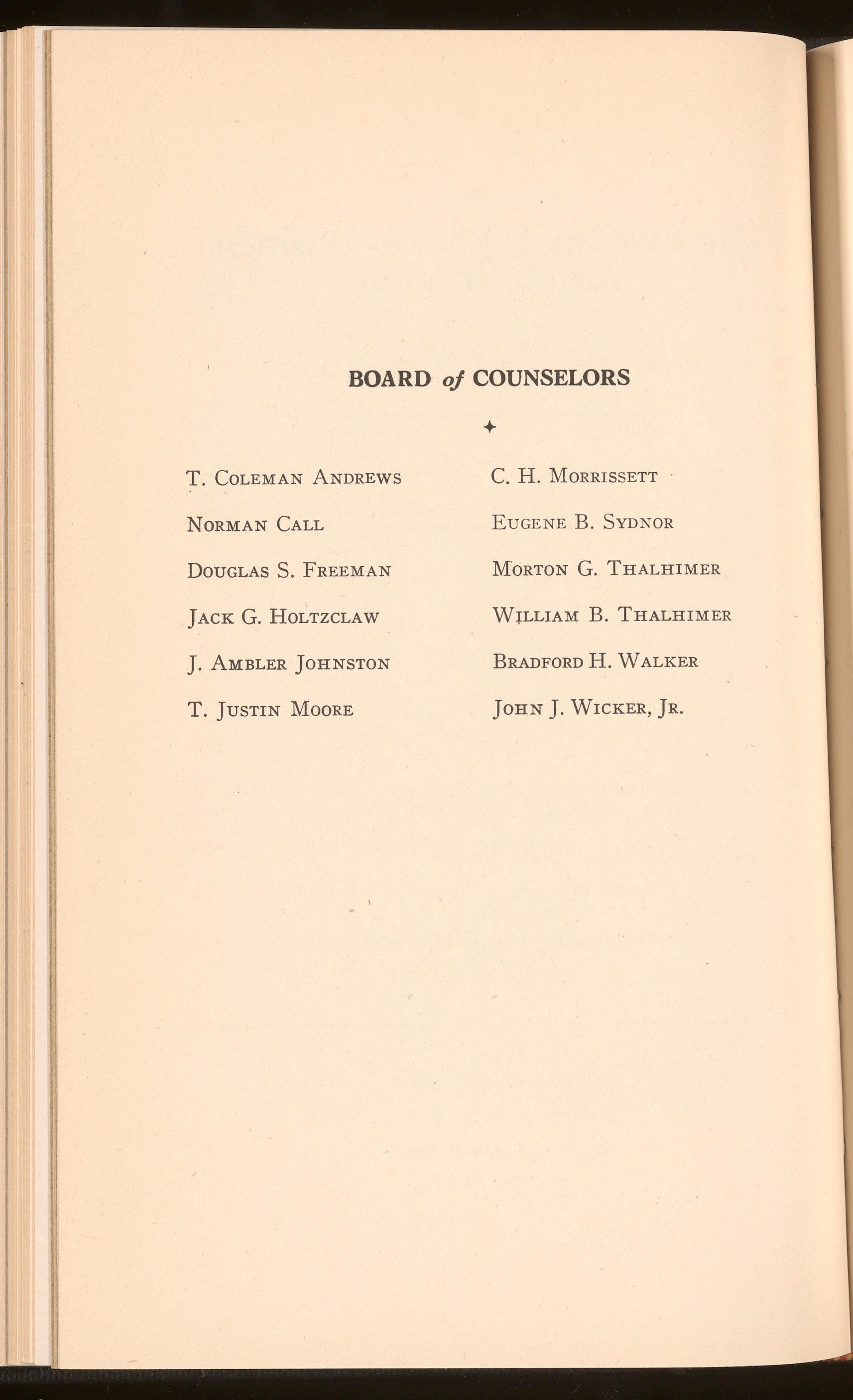
C. H. MoRRISSETT
EUGENE B. SYDNOR
MORTON G. THALHIMER
W+LLIAM B. THALHIMER
BRADFORD H. w ALKER
JOHN J. WICKER, JR.
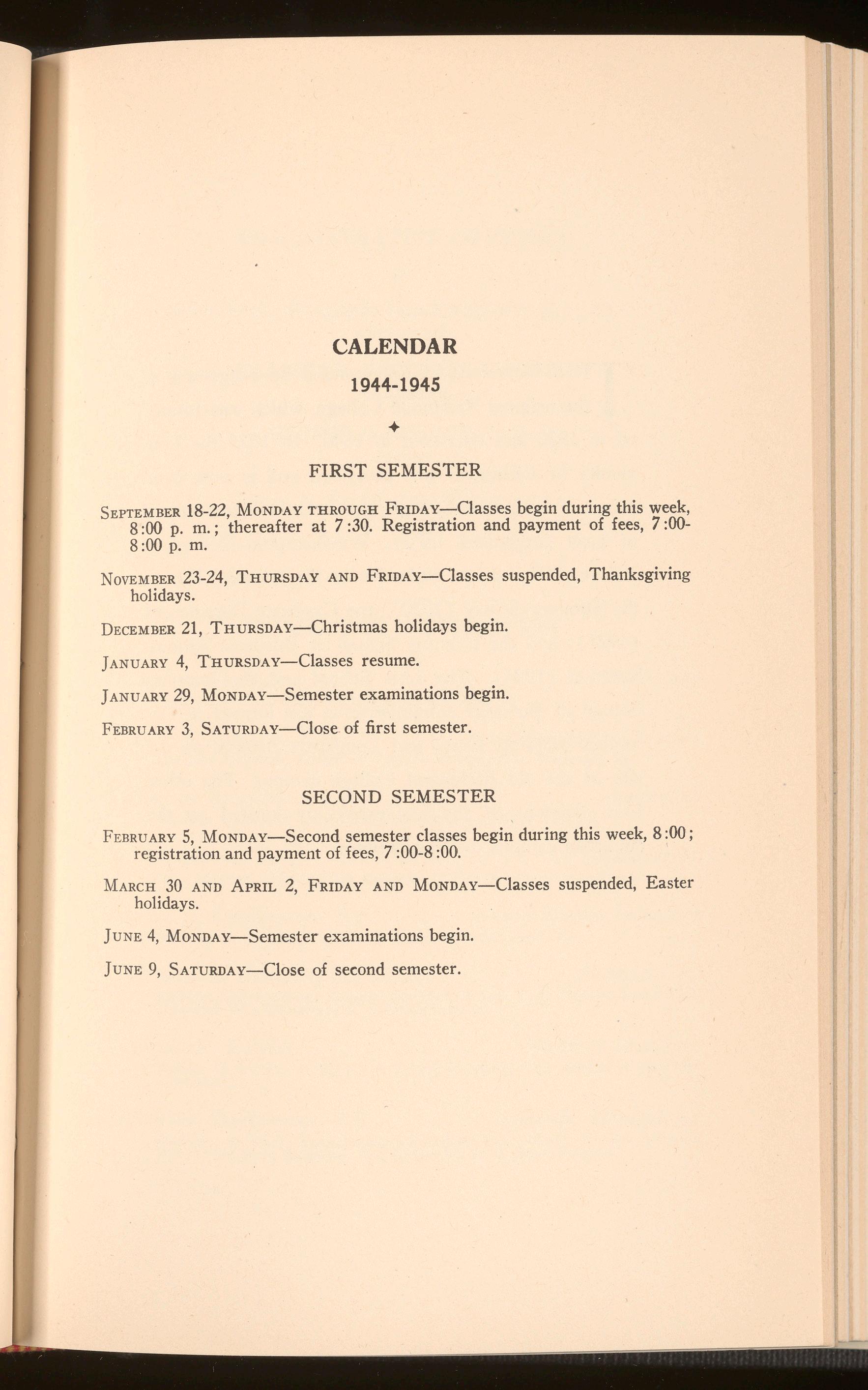
SEPTEMBER18-22, MoNDAY THROUGHFRIDAY-Classes begin during this week, 8 :00 p. m.; thereafter at 7 :30. Registration and payment of fees, 7 :008 :00 p. m.
NovEMBER23-24, THURSDAYANDFRIDAY-Classes suspended, Thanksgiving holidays.
DECEMBER21, THURSDAY-Christmas holidays begin.
JANUARY4, THURSDAY-Classes resume.
JANUARY29, MONDAY-Semester examinations begin.
FEBRUARY 3, SATURDAY-Close of first semester.
FEBRUARY 5, MONDAY-Second semester classes begin during this week, 8 :00; registration and payment of fees, 7 :00-8 :00.
MARCH30 AND APRIL 2, FRIDAYAND MONDAY-Classes suspended, Easter holidays.
JUNE4, MONDAY-Semester examinations begin.
JUNE 9, SATURDAY-Close of second semester.
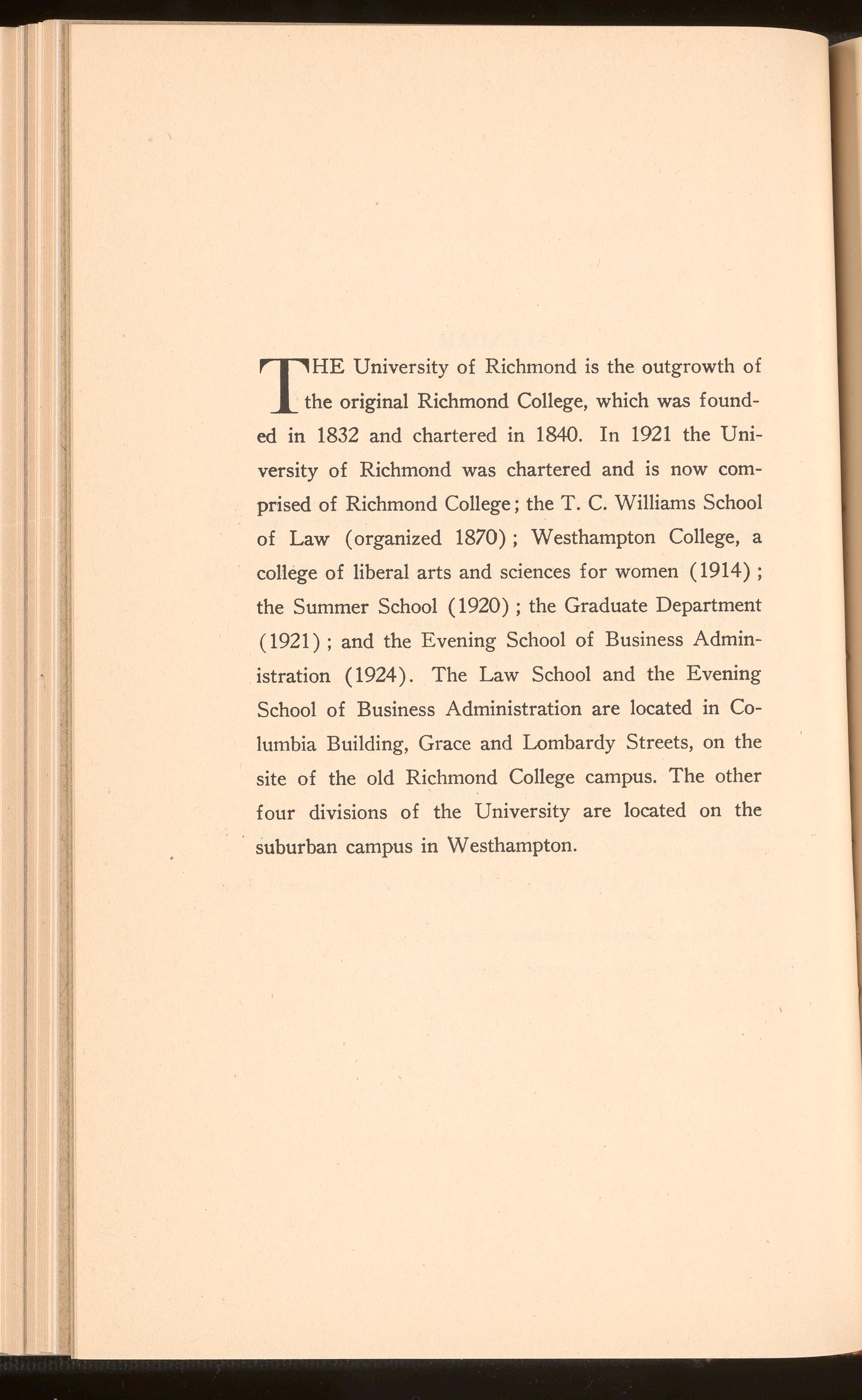
r--r,HE University of Richmond is the outgrowth of _J_the original Richmond College, which was founded in 1832 and chartered in 1840. In 1921 the University of Richmond was chartered and is now comprised of Richmond College; the T. C. Williams School of Law (organized 1870); Westhampton College, a college of liberal arts and sciences for women (1914); the Summer School (1920); the Graduate Department ( 1921) ; and the Evening School of Business Administration ( 1924). The Law School and the Evening School of Business Administration are located in Columbia Building, Grace and Lombardy Streets, on the site of the old Richmond College campus. The other four divisions of the University are located on the suburban campus in Westhampton.
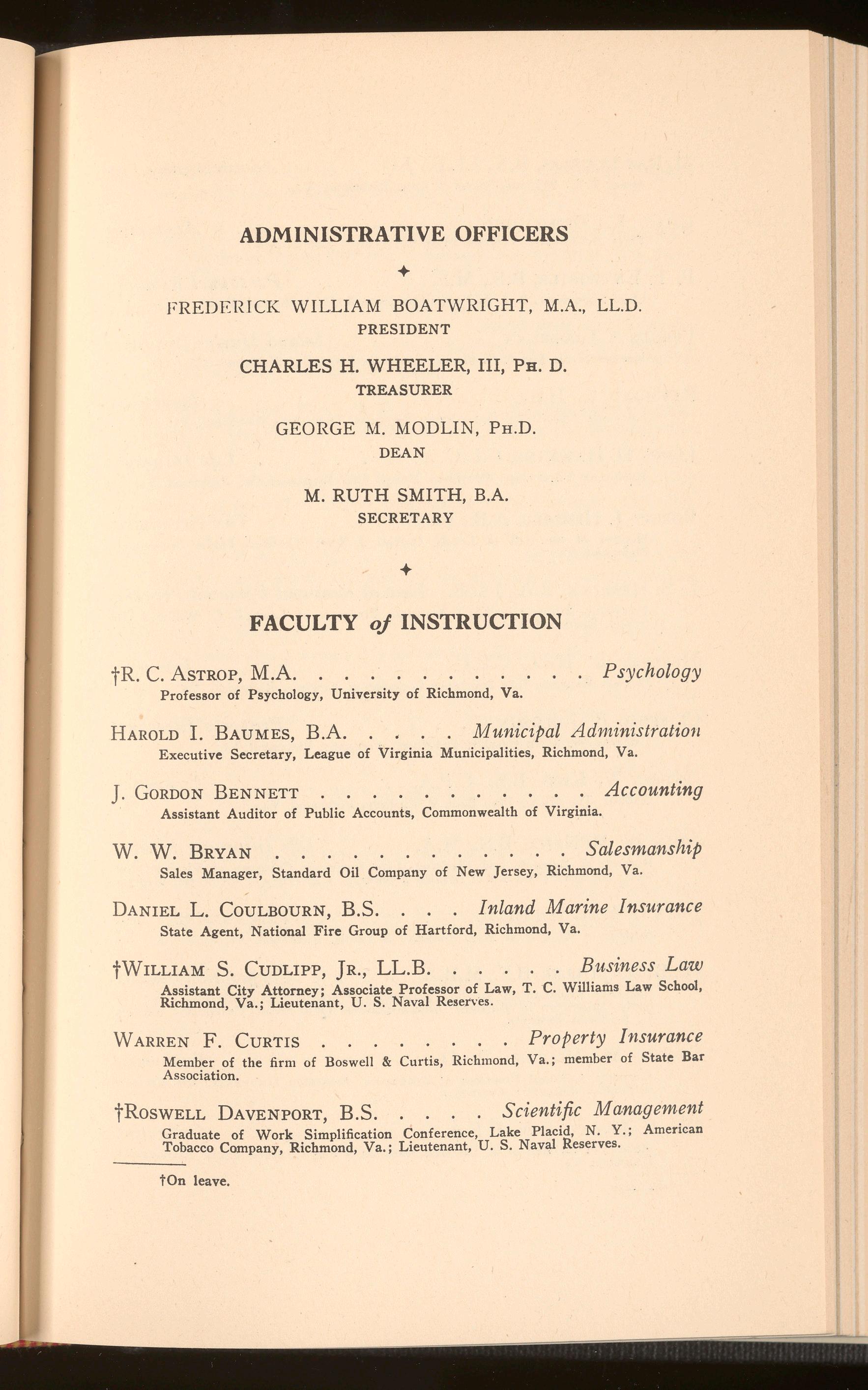
FREDERICK WILLIAM BOATWRIGHT, M.A., LL.D PRESIDENT
CHARLES H. WHEELER, III, PH. D. TREASURER
GEORGE M. MODLIN, PH.D. DEAN
M. RUTH SMITH, B.A. SECRETARY
t R. C. AsTROP, M.A.
Professor of Psychology, University of Richmond, Va. Psychology
HAROLD I. BAUMES, B.A. Municipal Adininistrati011
Executive Secretary, League of Virginia Municipalities, Richmond, Va
J . GORDON BENNETT Accounting
Assistant Auditor of Public Accounts, Commonwealth of Virginia.
W.W. BRYAN SaJ,esmanship Sales Manager, Standard Oil Company of New Jersey, Richmond, Va
D A NIEL L. CouLBOURN, B.S. Inland Marine Insurance State Agent, National Fire Group of Hartford, Richmond, Va .
tW1LLIAM S. CuDLIPP, JR., LL.B. Business Law
Assistant City Attorney; Associate Professor of Law, T. C Williams Law School, Richmond, Va.; Lieutenant, U. S. Naval Reserves
WARREN F. CURTIS Property Insurance
Member of the firm of Boswell & Curtis , Richmond, Va ; member of State Bar Association.
tRoswELL DAVENPORT, B.S. Scienti fie Management
Graduate of Work Simplification Conference, Lake Placid, N. Y.; American Tobacco Company, Richmond , Va.; Lieutenant, U. S . Naval Reserves ton leave.
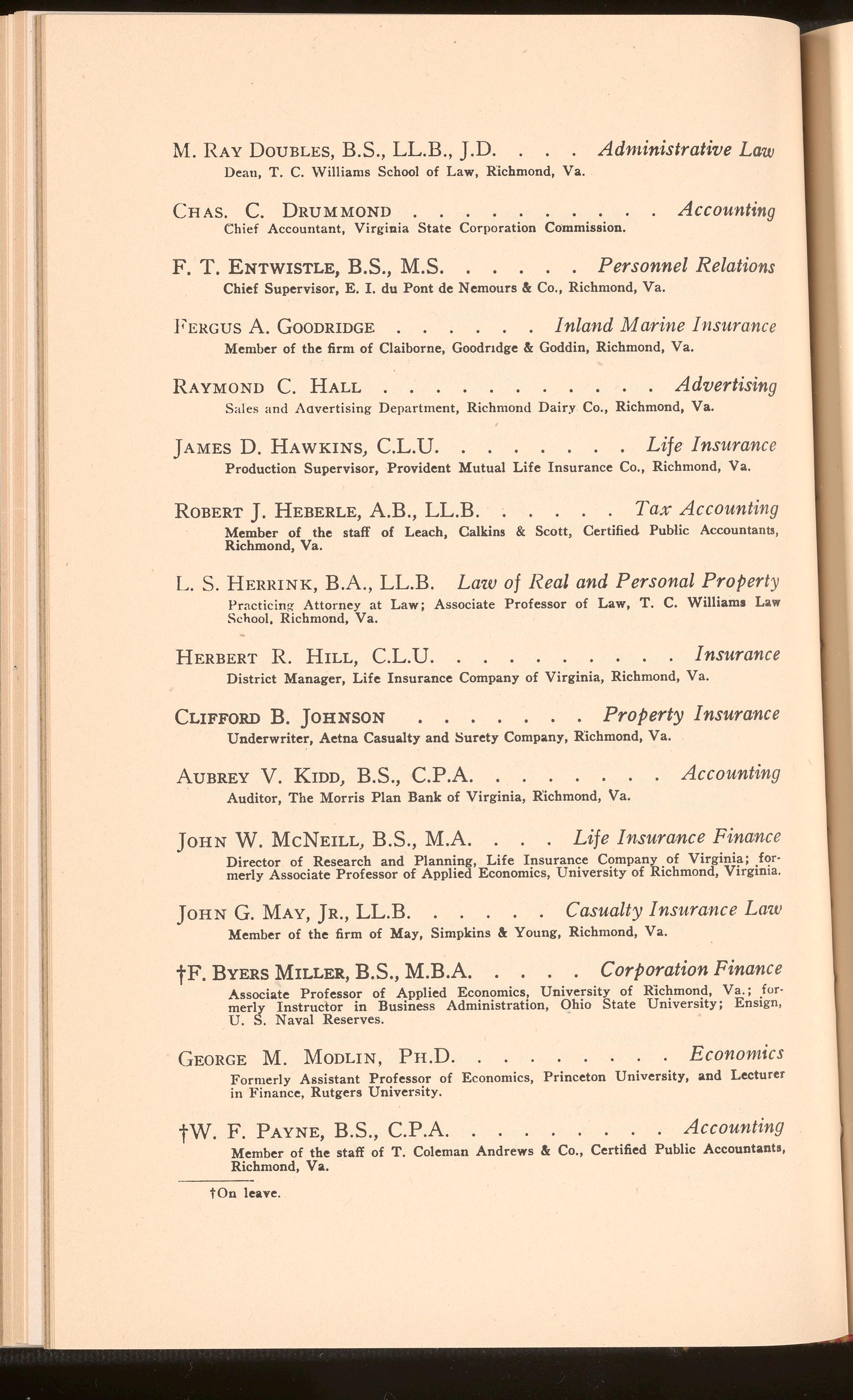
M. RAY DOUBLES, B.S., LL.B., J.D. Administrative Law
Dean, T. C. \Villiams School of Law, Richmond, Va.
CHAS. C. DRUMMOND
Chief Accountant, Virginia State Corporation Commission. Accounting
F. T. ENTWISTLE, B.S., M.S. Personnel Relations Chief Supervisor, E I du Pont de Nemours & Co , Richmond, Va.
FERGUS A. GOODRIDGE Inland Marine Insurance Member of the firm of Claiborne, Goodridge & Goddin, Richmond, Va.
RAYMOND C. HALL Advertising Sales and Aavertising Department, Richmond Dairy Co., Richmond, Va.
JAMES D. HAWKINS, C.L.U. Life Insuranc e Production Supervisor, Provident Mutual Life Insurance Co , Richmond, Va.
ROBERT J. HEBERLE, A.B., LL.B. Tax Accounting Member of the staff of Leach, Calkins & Scott, Certified Public Accountants, Richmond, Va.
L. S. HERRINK, B.A., LL.B. Law of Real and Personal Propert y Pr~cticin:.r Attorney at Law; Associate Professor of Law, T. C. Williams Law School, Richmond, Va.
HERBERT R. HILL, C.L.U. Insuranc e District Manager, Life Insurance Company of Virginia, Richmond, Va.
CLIFFORD B. JOHNSON Property Insurance Underwriter, Aetna Casualty and i:;urety Company, Richmond, Va.
AUBREY V. KIDD, B.S., C.P.A. Accounting Auditor, The Morris Plan Bank of Virginia, Richmond, Va.
JoHN W. McNEILL, B.S., M.A. Life Insurance Financ e Director of Research and Planning, Life Insurance Compani of Virginia; for· merly Associate Professor of Applied Economics, University of Richmond, Virgini a.
JOHN G. MAY, JR., LL.B Casualty Insurance Law Member of the firm of May, Simpkins & Young, Richmond, Va.
tF. BYERS MILLER, B.S., M.B.A. Corporation Finance Associate Professor of Applied Economics, University of Richmond, Va.; for • merl_y Instruclor in Business Administration, Ohio State University; Ensign , U. S Naval Reserves.
GEORGE M. MODLIN, PH.D. Economics Formerly Assistant Professor of E conomics, Princeton University, and Lecturer in Finance, Rutgers University .
tW. F. PAYNE, B.S., C.P.A. Accounting Member of the staff of T. Coleman Andrews & Co., Certified Public Accountants, Richmond, Va. ton leave.
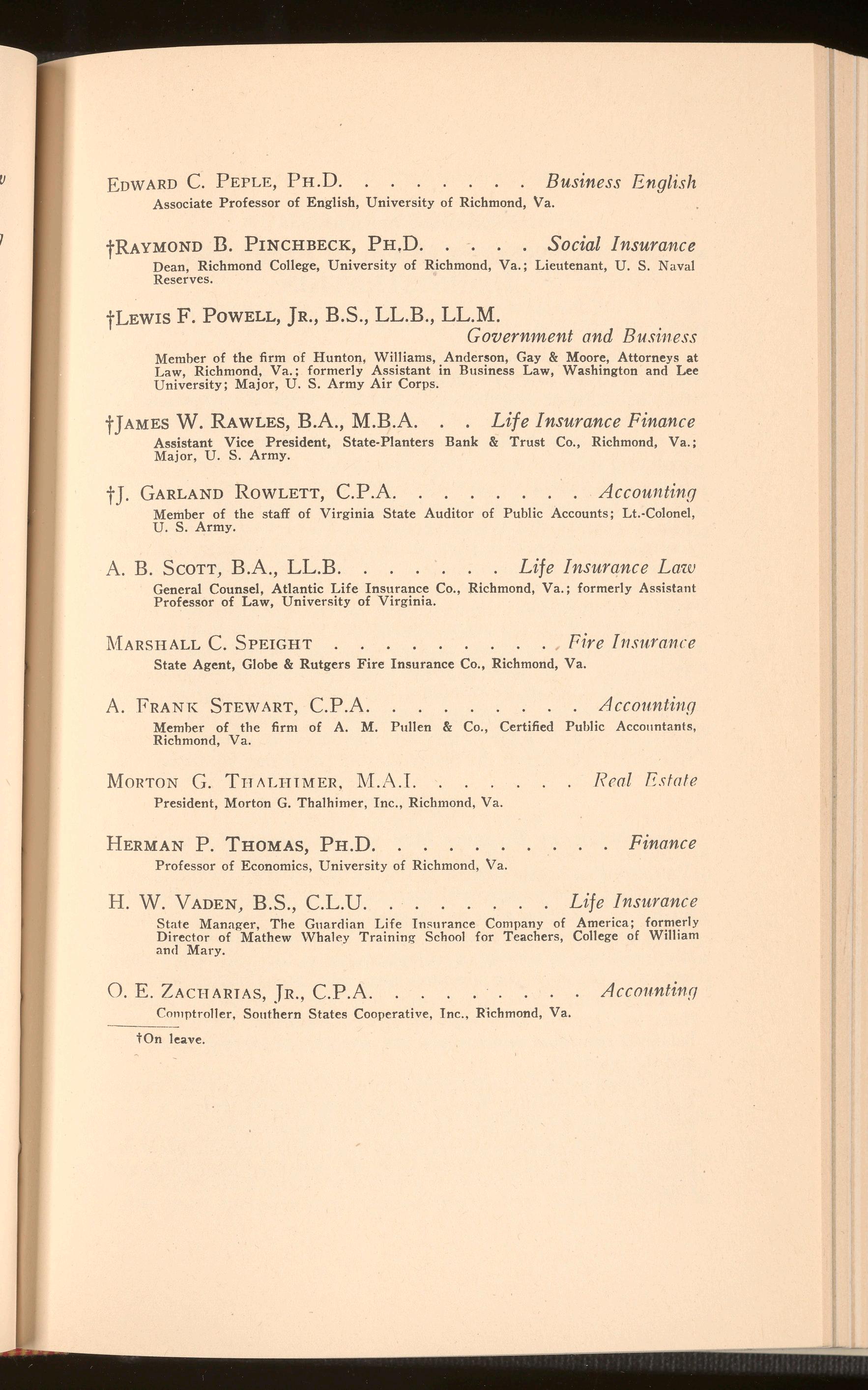
EDWARD C. PEPLE, PH.D. Business English
Associate Professor of English, University of Richmond, Va
tRAYMOND Il. PINCHBECK, PH,D. Social Insurance
Dean, Richmond College, University of Richmond, Va.; Lieutenant, U. S. Naval Reserves.
tLEWIS F. POWELL, JR., B.S., LL.B., LL.M. Government and Business
Member of the firm of Hunton, Williams, Anderson, Gay & Moore, Attorneys at Law, Richmond, Va.; formerly Assistant in Business Law, Washington and Lee University; Major, U. S. Army Air Corps.
tJAMES W. RAWLES, B.A., M.B.A. Life Insurance Finance
Assistant Vice President, State-Planters Bank & Trust Co., Richmond, Va ; Major, U. S. Army
tJ. GARLAND ROWLETT, C.P.A. Accounting
Member of the staff of Virginia State Auditor of Public Accounts; Lt .-Colonel , U S Army
A. B. SCOTT, B.A., LL.B. Life Insurance Law
General Counsel, Atlantic Life Insurance Co. , Richmond, Va . ; formerly Assistant Professor of Law, University of Virginia.
MARSHALL C. SPEIGHT fire Insurance
State Agent, Globe & Rutgers Fire Insurance Co., Richmond, Va.
A. FRANK STEWART, C.P.A. A cco1tntinr;
Member of the firm of A. M. Pullen & Co , Certified Public Accmmtanls, Richmond, Va.
MORTON G. TH ALHTMER. M.A .T. l?ral f,,sfafe
President, Morton G. Thalhimer, Inc., Richmond , Va.
HERMAN P. THOMAS, PH.D. Finance
Professor of Economics, University of Richmond , Va .
H. w. VADEN, B.S., C.L.U. Life Insurance
State Manager, The Gt1ardian Life Insurance Company of America; formerly Director of Mathew vVhaley Training School for Teachers, College of William and Mary.
0 E ZACHARIAS, JR., C.P.A. Accou.ntin,r;
Co111ptroller, Southern States Cooperative, Inc. , Richmond, Va. tOn leave .
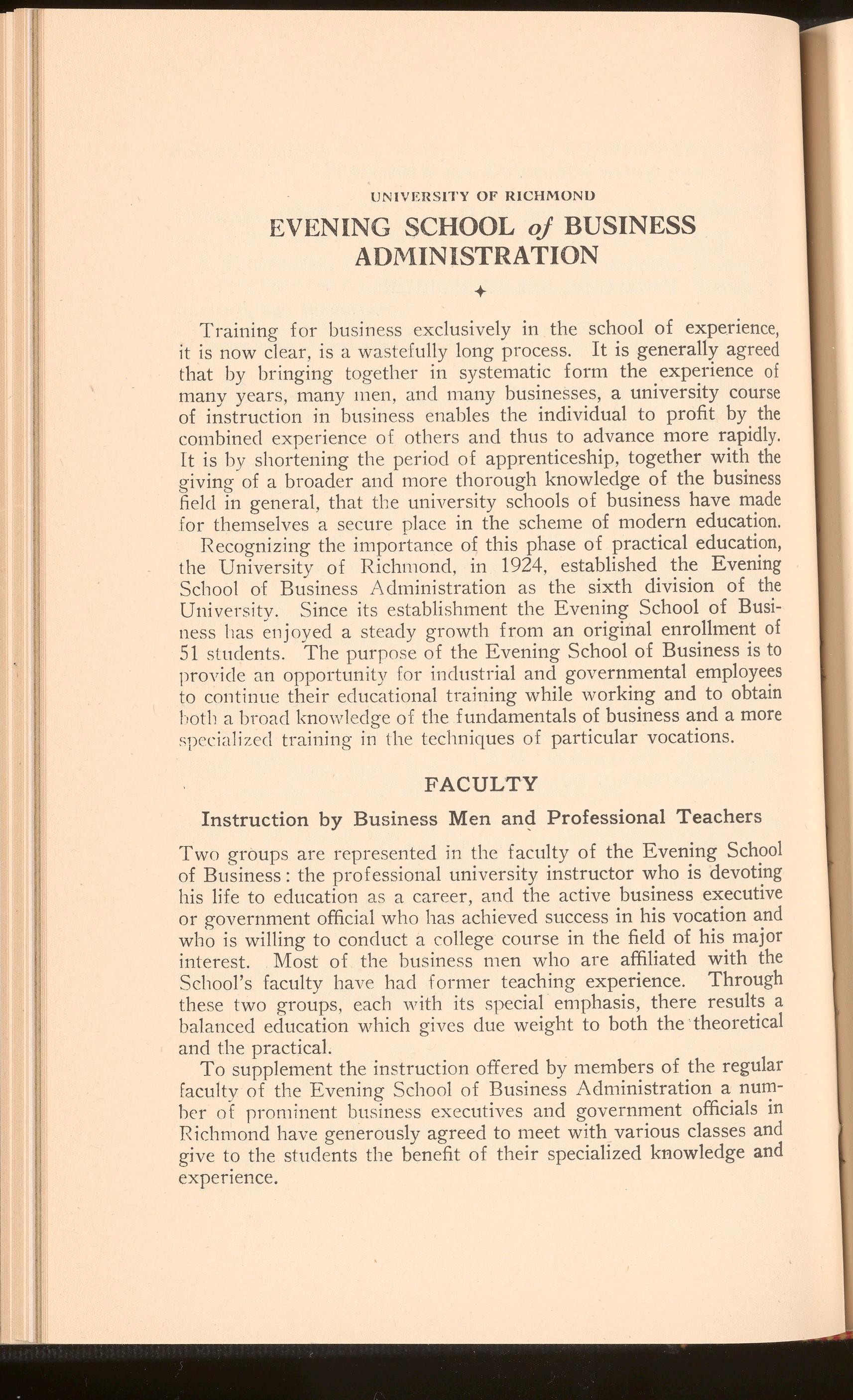
Training for bu siness exclusively in the school of experience, it is now clear, is a wastefully long process. It is generally agreed that by bringing tog ether in systematic form the experience of many years, many men, and many businesses, a university course of instruction in business enables the individual to profit by the combined experience of others and thus to advance more rapidly. [t is by shortening the period of apprenticeship, together with the giving of a broad e r and more thorough knowledge of the business field in general, that the university schools of business have made for themselves a secure place in the scheme of modern education.
Recognizing th e importance of this phase of practical education, the University of Richmond, in 1924, established the Evening School of Business A dministration as the sixth division of the University. Since its establishment the Evening School of Business lias enjoyed a steady growth from an original enrollment of S1 sluclents. The purpose of the Evening School of Business is to provide an opportunity for industrial and governmental employees to continue their ed ucational training while working and to obtain hoth a broad knowl edge of the fundamentals of business and a more f'JX'cializccl training in the techniques of particular vocations.
Two groups are represented in the faculty of the Evening School of Business: the professional university instructor who is devoting his life to education as a career, and the active business executive or government official who has achieved success in his vocation and who is willing to conduct a college course in the field of his major interest. Most of the business men who are affiliated with the School's faculty hav e had former teaching experience. Through the se two groups, each with its special emphasis, there results a balanced education which gives clue weight to both the theoretical and the practical.
To supplement the instruction offered by members of the regular faculty of the Evening School of Business Administration a number of prominent business executives and government officials in Richmond have generously agreed to meet with various classes and give to the students the benefit of their specialized knowledge and experience.
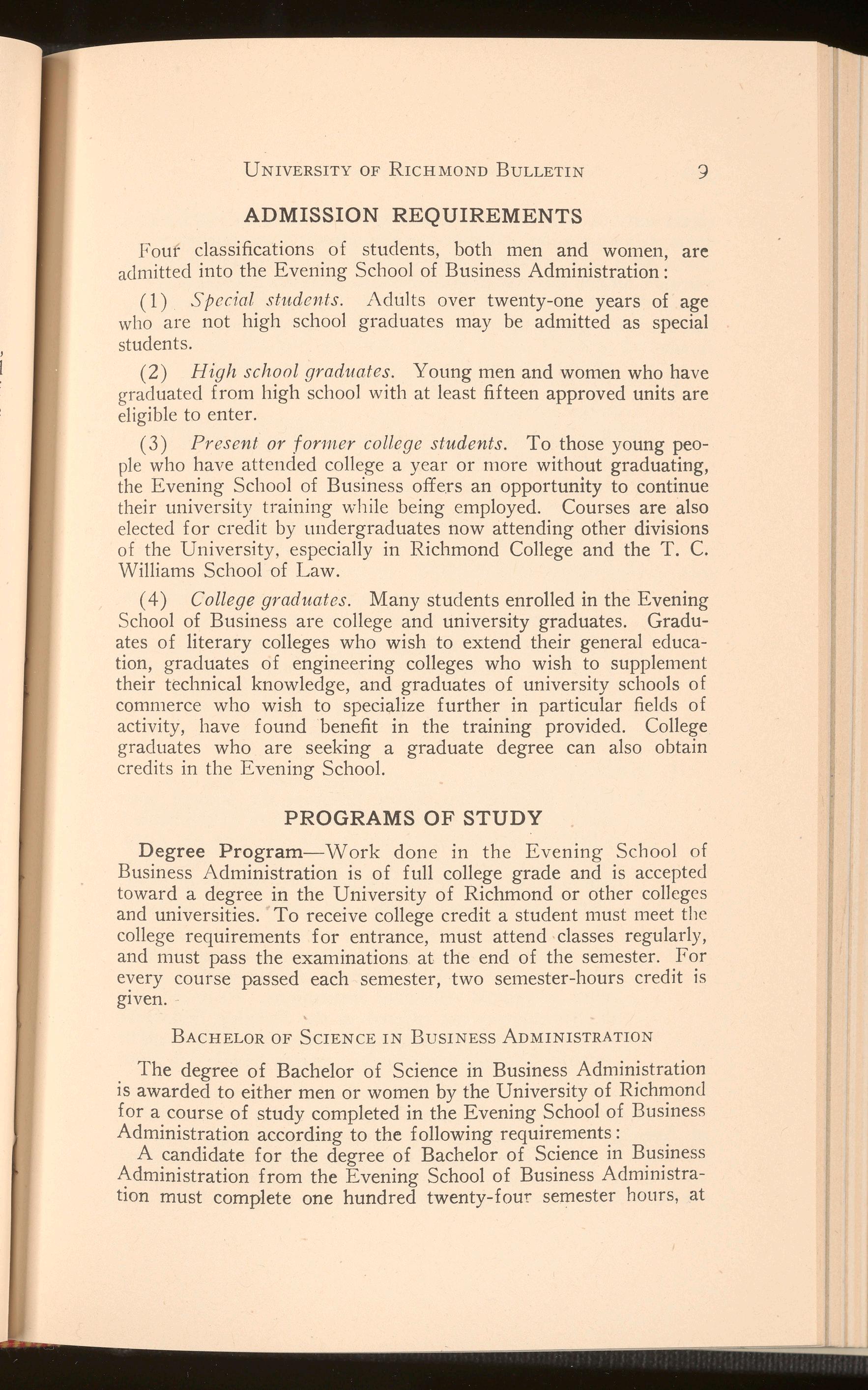
Four classifications of students, both men and women, are admitted into the Evening School of Business Administration:
( 1) Special students. Adu lts over twenty-one years of age who are not high school graduates may be admitted as special students.
(2) High school graduates. Young men and women who have graduated from high school with at least fifteen approved units are eligible to enter.
(3) Present or former college students. To those young people who have attended college a year or more without graduating, the Evening School of Business offers an opportunity to continue their university training while being employed. Courses are also elected for credit by undergraduates now attending other divisions of the University, especially in Richmond College and the T. C. Williams School of Law.
( 4) Callege graduates. Many students enrolled in the Evening School of Business are college and university graduates. Graduates of literary colleges who wish to extend their general education, graduates of engineering colleges who wish to supplement their technical knowledge, and graduates of university schools of commerce who wish to specialize further in particular fields of activity, have found benefit in the training provided. College graduates who are seeking a graduate degree can also obtain credits in the Evening School.
Degree Program-Work done in the Evening School of Business Administration is of full college grade and is accepted toward a degree in the University of Richmond or other colleges and universities. To receive college credit a student must meet the college requirements for entrance, must attend classes regularly, and must pass the examinations at the end of the semester. For e:7ery course passed each semester, two semester-hours credit is given. -
The degree of Bachelor of Science in Business Administration is awarded to either men or women by the University of Richmond for a course of study completed in the Evening School of Business Administration according to the following requirements : A candidate for the degree of Bachelor of Science in B~~iness Administration from the Evening School of Business Adm1111stration must complete one hundred twenty-four semester hours, at
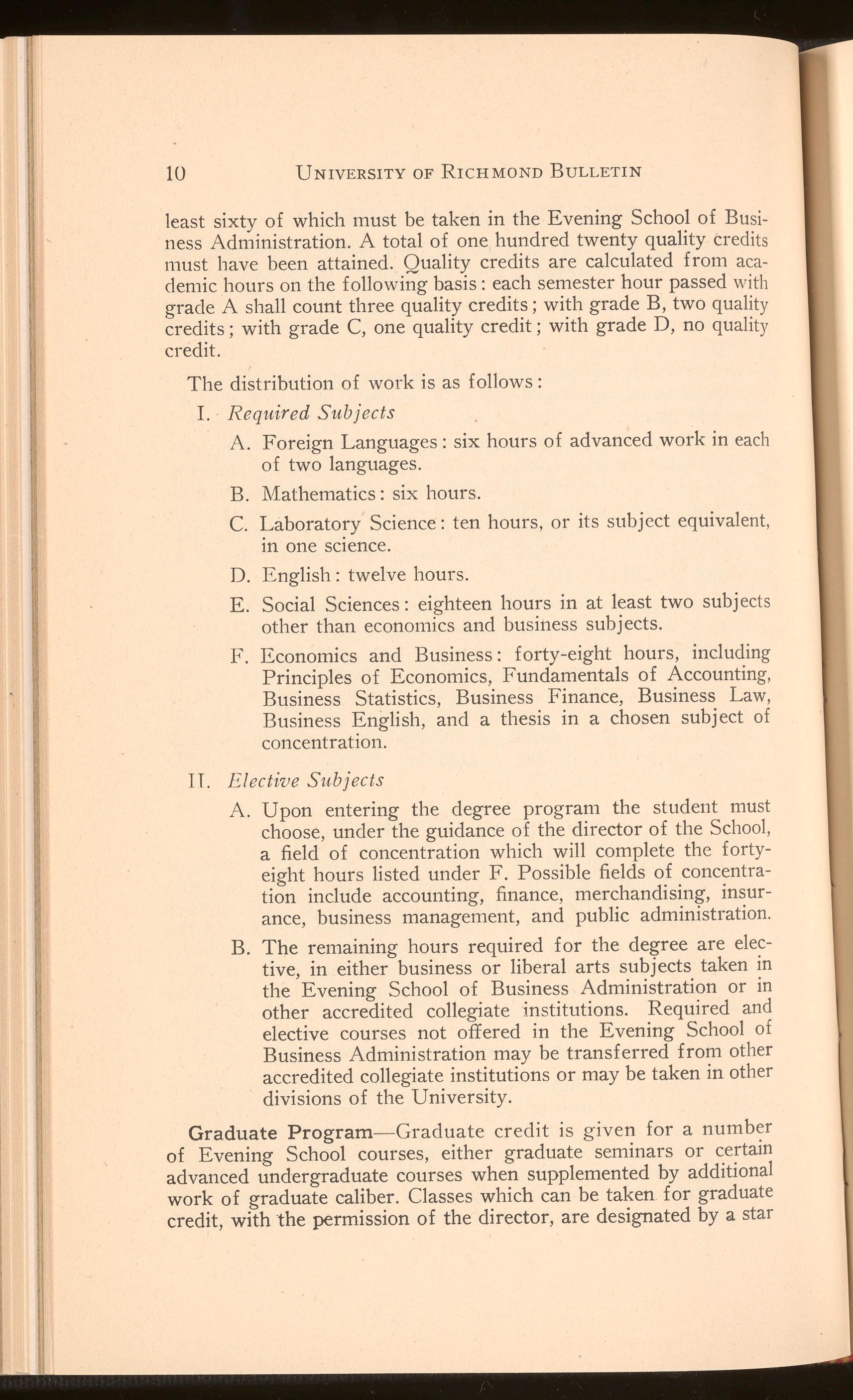
least sixty of which must be taken in the Evening School of Business Administration. A total of one hundred twenty quality credits must have been attained. Quality credits are calculated from academic hours on the following basis : each semester hour passed with grade A shall count three quality credits; with grade B, two quality credits; with grade C, one quality credit; with grade D, no quality credit.
The distribution of work is as follows:
A. Foreign Languages: six hours of advanced work in each of two languages.
B. Mathematics: six hours.
C. ~aborato~y Science: ten hours, or its subject equivalent , m one science.
D. English: twelve hours.
E. Social Sciences: eighteen hours in at least two subjects other than economics and business subjects.
F. Economics and Business: forty-eight hours, including Principles of Economics, Fundamentals of Accounting, Business Statistics, Business Finance, Business Law, Business English, and a thesis in a chosen subject of concentration.
A. Upon entering the degree program the student must choose, under the guidance of the director of the School, a field of concentration which will complete the fortyeight hours listed under F. Possible fields of concentration include accounting, finance, merchandising, insurance, business management, and public administration.
B. The remaining hours required for the degree are elective, in either business or liberal arts subjects taken in the Evening School of Business Administration or in other accredited collegiate institutions. Required and elective courses not offered in the Evening School of Business Administration may be transferred from other accredited collegiate institutions or may be taken in other divisions of the University.
Graduate Program-Graduate credit is given for a number of Evening School courses, either graduate seminars or certain advanced undergraduate courses when supplemented by additional work of graduate caliber. Classes which can be taken for graduate credit, with the permission of the director, are designated by a star

in the list of courses described in the catalogue. Graduate students interested especially in the fields of economics and government can complete in the Evening School a substantial portion, possibly all, of the work necessary to obtain a Master of Arts degree from the University of Richmond. Credits can also be transferred to other universities. Business men, teachers, government employees, and others have obtained graduate credits in the Evening School. A student desiring graduate work should confer with the director of the School.
Certificate
University of Richmond will grant a Certificate in Business Administration or a Certificate in Public Administration to a student, admitted under any of the four classifications, who has successfully completed thirty-six semester hours of classroom work according to a prescribed program approved by the director of the School. Several programs of concentratio n are offered, and a Certificate will be granted in the field of concentration selected. The curricula in the several fields are as follows:
Accounting
First year: Accounting I, Business English, Business Law.
Second year: Accounting II, Corporation Finance, Accounting VII.
Third year: Accounting III, Cost Accounting VI.
Fourth year: Tax Accounting IV, Auditing.
Finance
First year: Accounting I, Business English, Economics.
Second year: Business Finance, Business Law, Business Statistics.
Third year: Corporation Finance, Insurance Principles, Elective.
Insurance
First year: Business English, Economics, C.L.U. A and B or a course in Property Insurance.
Second year: Business Statistics, Business Law, C.L.U. C and D or a course in Property Insurance.
Third year: Corporation Finance, Elective, C.L.U. E or a course in Property Insurance.
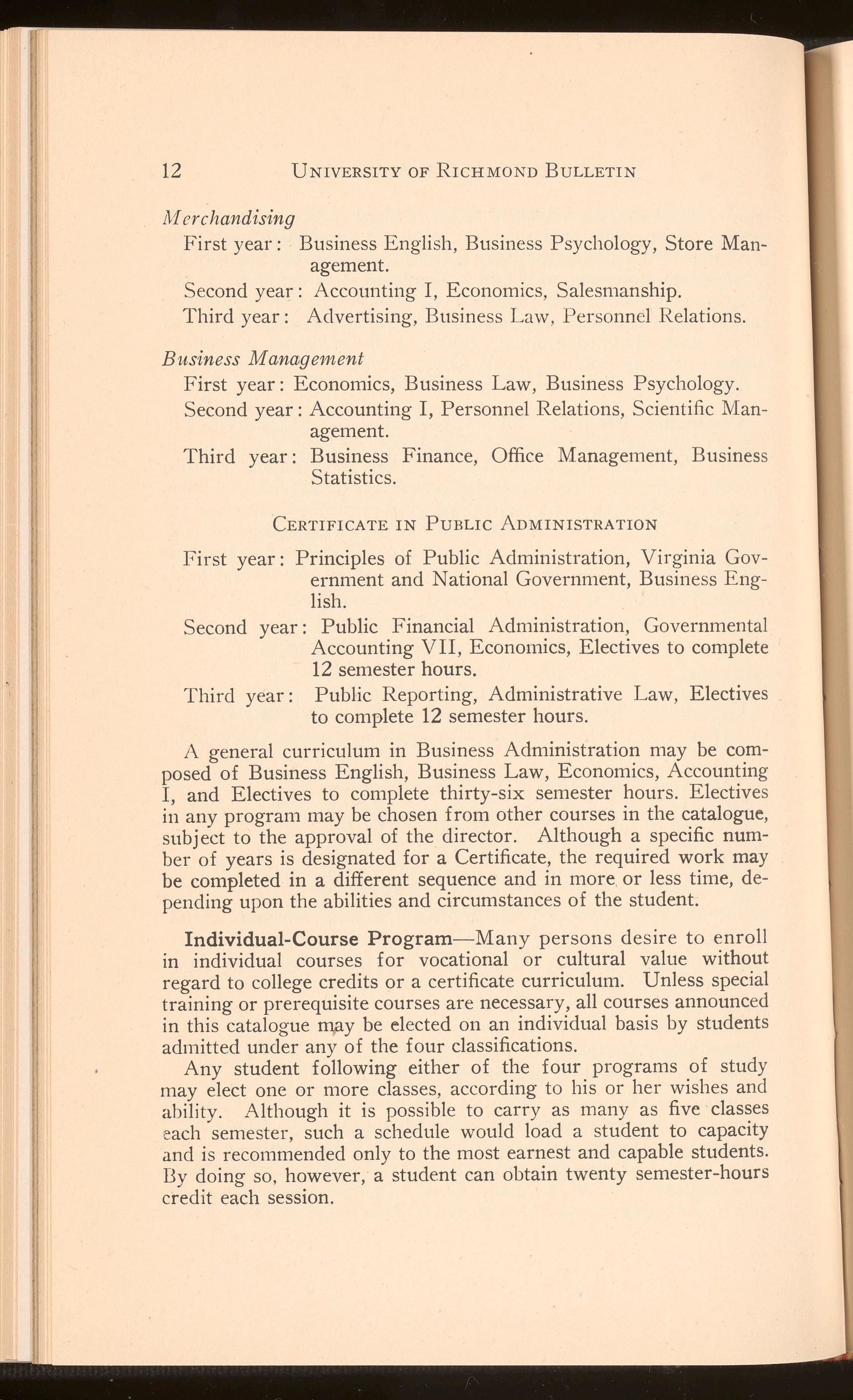
Merchandising
First year: Business English, Business Psychology, Store Management.
Second year: Accounting I, Economics, Salesmanship.
Third year: Advertising, Business Law, Personnel Relations.
Business Management
First year: Economics, Business Law, Business Psychology.
Second year: Accounting I, Personnel Relations, Scientific Management.
Third year: Business Finance, Office Management, Business Statistics.
First year: Principles of Public Administration, Virginia Government and National Government, Business English.
Second year: Public Financial Administration, Governmental Accounting VII, Economics, Electives to complete 12 semester hours.
Third year: Public Reporting, Administrative Law, Electives to complete 12 semester hours.
A general curriculum in Business Administration may be composed of Business English, Business Law, Economics, Accounting I, and Electives to complete thirty-six semester hours. Electives in any program may be chosen from other courses in the catalogue, subject to the approval of the director. Although a specific number of years is designated for a Certificate, the required work may be completed in a different sequence and in more or less time, depending upon the abilities and circumstances of the student.
Individual-Course Program-Many persons desire to enroll in individual courses for vocational or cultural value without regard to college credits or a certificate curriculum. Unless special training or prerequisite courses are necessary, all courses announced in this catalogue m;iy be elected on an individual basis by students admitted under any of the four classifications.
Any student following either of the four programs of study may elect one or more classes, according to his or her wishes and ability. Although it is possible to carry as many as five classes each semester, such a schedule would load a student to capacity and is recommended only to the most earnest and capable students. Dy doing so, however, a student can obtain twenty semester-hours credit each session.
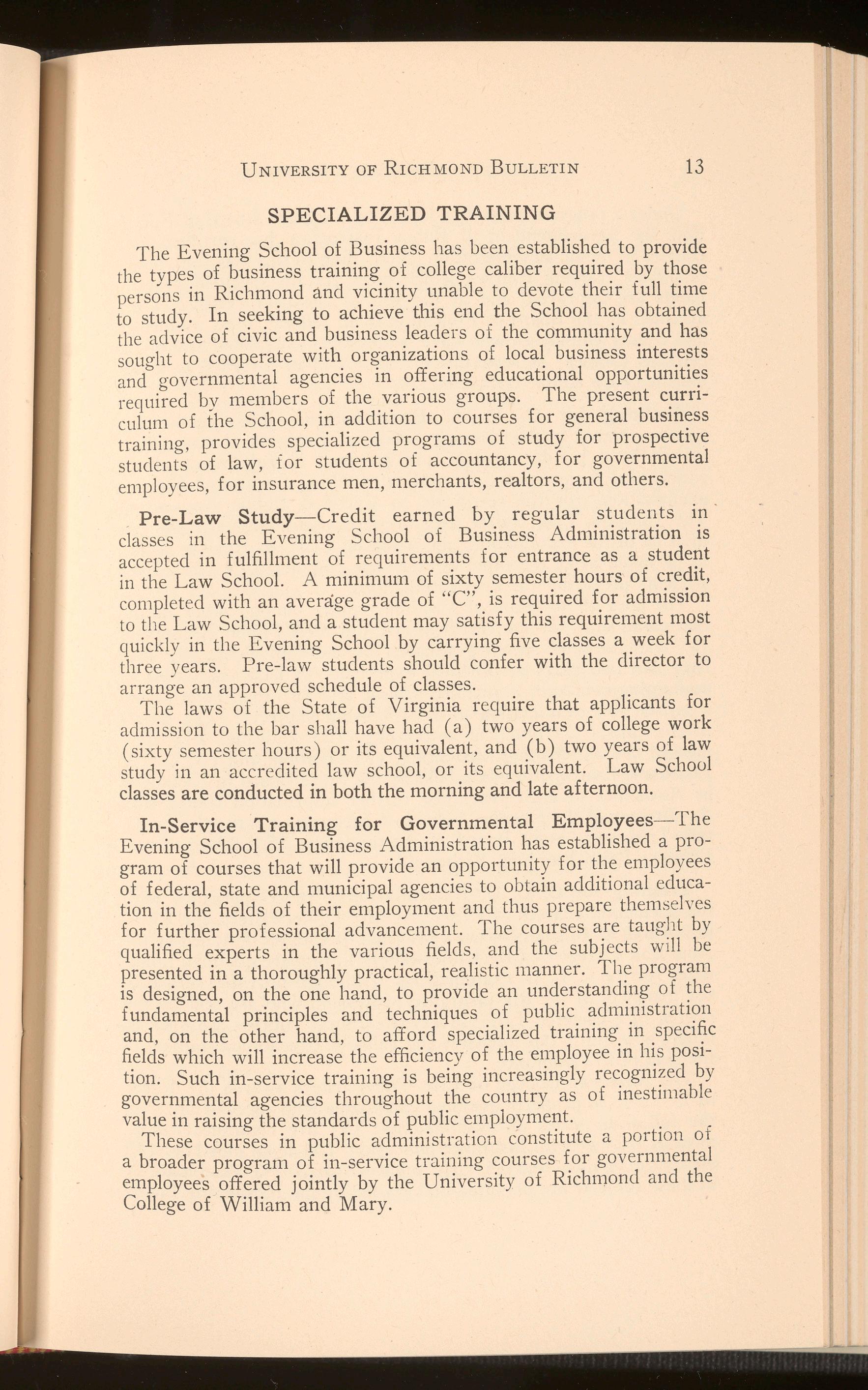
The Evening School of Business has been established to provide the types of business training of college caliber required by those persons in Richmond and vicinity unable to devote their full time to study. In seeking to achieve this end the School has obtained the advice of civic and business leaders of the community and has sought to cooperate with organizations of local business interests and governmental agencies in offering educational opportunities required by members of the various groups. The present curriculum of the School, in addition to courses for general business training, provides specialized programs of study for prospective students of law, ior students of accountancy, for governmental employees, for insurance men, merchants, realtors, and others.
Pre-Law
earned by regular students in · classes in the Evening School of Business Administration is accepted in fulfillment of requirements for entrance as a student in the Law School. A minimum of sixty semester hours of credit, completed with an average grade of "C", is required for admission to the Law School, and a student may satisfy this requirement most quickly in the Evening School by carrying five classes a week for three years. Pre-law students should confer with the director to arrange an approved schedule of classes.
The laws of the State of Virginia require that applicants for admission to the bar shall have had (a) two years of college work ( sixty semester hours) or its equivalent, and ( b) two years of law study in an accredited law school, or its equivalent. Law School classes are conducted in both the morning and late afternoon.
Evening School of Business Administration has established a program of courses that will provide an opportunity for the employees of federal, state and municipal agencies to obtain additional education in the fields of their employment and thus prepare themselves for further professional advancement. The courses are taught by qualified experts in the various fields. and the subjects will be presented in a thoroughly practical, realistic manner. The program is designed, on the one hand, to provide an understanding of the fundamental principles and techniques of public administration and, on the other hand, to afford specialized training in specific fi_eldswhich will increase the efficiency of the employee in his position. Such in-service training is being increasingly recognized by governmental agencies throughout the country as of inestimable value in raising the standards of public employment.
These courses in public administration constitute a portion of a broader program of in-service training courses for governmental employees offered jointly by the University of Richmond and the College of William and Mary.
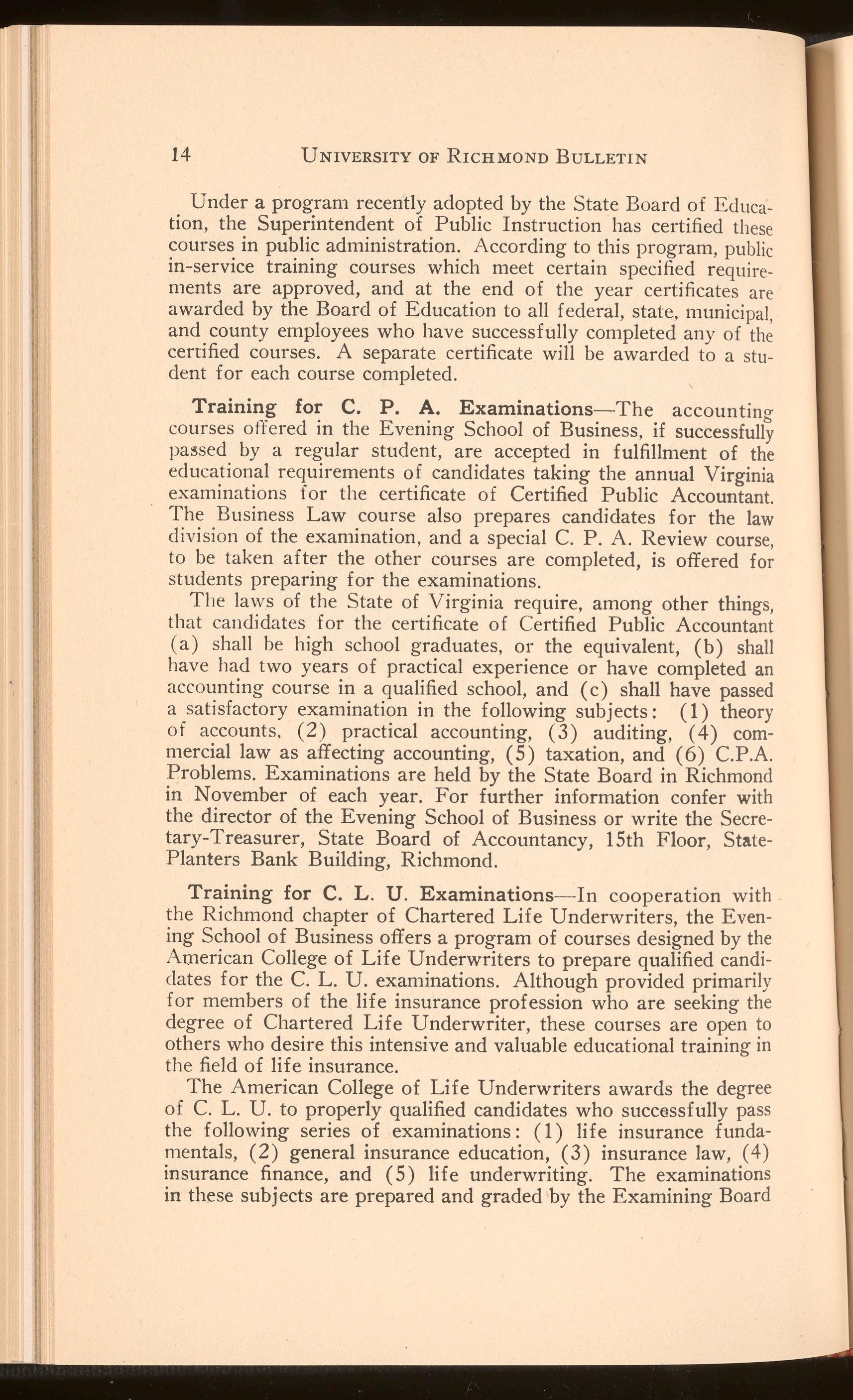
Under a program recently adopted by the State Board of Education, the Superintendent of Public Instruction has certified these courses in public administration. According to this program, public in-service training courses which meet certain specified requirements are approved, and at the end of the year certificates are awarded by the Board of Education to all federal, state. municipal , and county employees who have successfully completed any of the certified courses. A separate certificate will be awarded to a student for each course completed.
Training for C. P. A. Examinations-The accounting courses offered in the Evening School of Business, if successfully pa:5sed by a regular student, are accepted in fulfillment of the educational requirements of candidates taking the annual Virginia examinations for the certificate of Certified Public Accountant. The Business Law course also prepares candidates for the law division of the examination, and a special C. P. A. Review course, to be taken after the other courses are completed, is offered for students preparing for the examinations.
The laws of the State of Virginia require, among other things, that candidates for the certificate of Certified Public Accountant (a) shall be high school graduates, or the equivalent, ( b) shall have had two years of practical experience or have completed an accounting course in a qualified school, and ( c) shall have passed a satisfactory examination in the following subjects: ( 1) theory of accounts. (2) practical accounting, ( 3) auditing, ( 4) commercial law as affecting accounting, ( 5) taxation, and ( 6) C.P.A. Problems. Examinations are held by the State Board in Richmond in November of each year. For further information confer with the director of the Evening School of Business or write the Secretary-Treasurer, State Board of Accountancy, 15th Floor, StatePlanters Bank Building, Richmond.
Training for C. L. U. Examinations-In cooperation with the Richmond chapter of Chartered Life Underwriters, the Evening School of Business offers a program of courses designed by the American College of Life Underwriters to prepare qualified candidates for the C. L. U. examinations. Although provided primarily for members of the life insurance profession who are seeking the degree of Chartered Life Underwriter, these courses are open to others who desire this intensive and valuable educational training in the field of life insurance.
The American College of Life Underwriters awards the degree of C. L. U. to properly qualified candidates who succBssfully pass the following series of examinations: ( 1) life insurance fundamentals, (2) general insurance education, ( 3) insurance law, ( 4) insurance finance, and ( 5) life underwriting. The examinations in these subjects are prepared and graded by the Examining Board
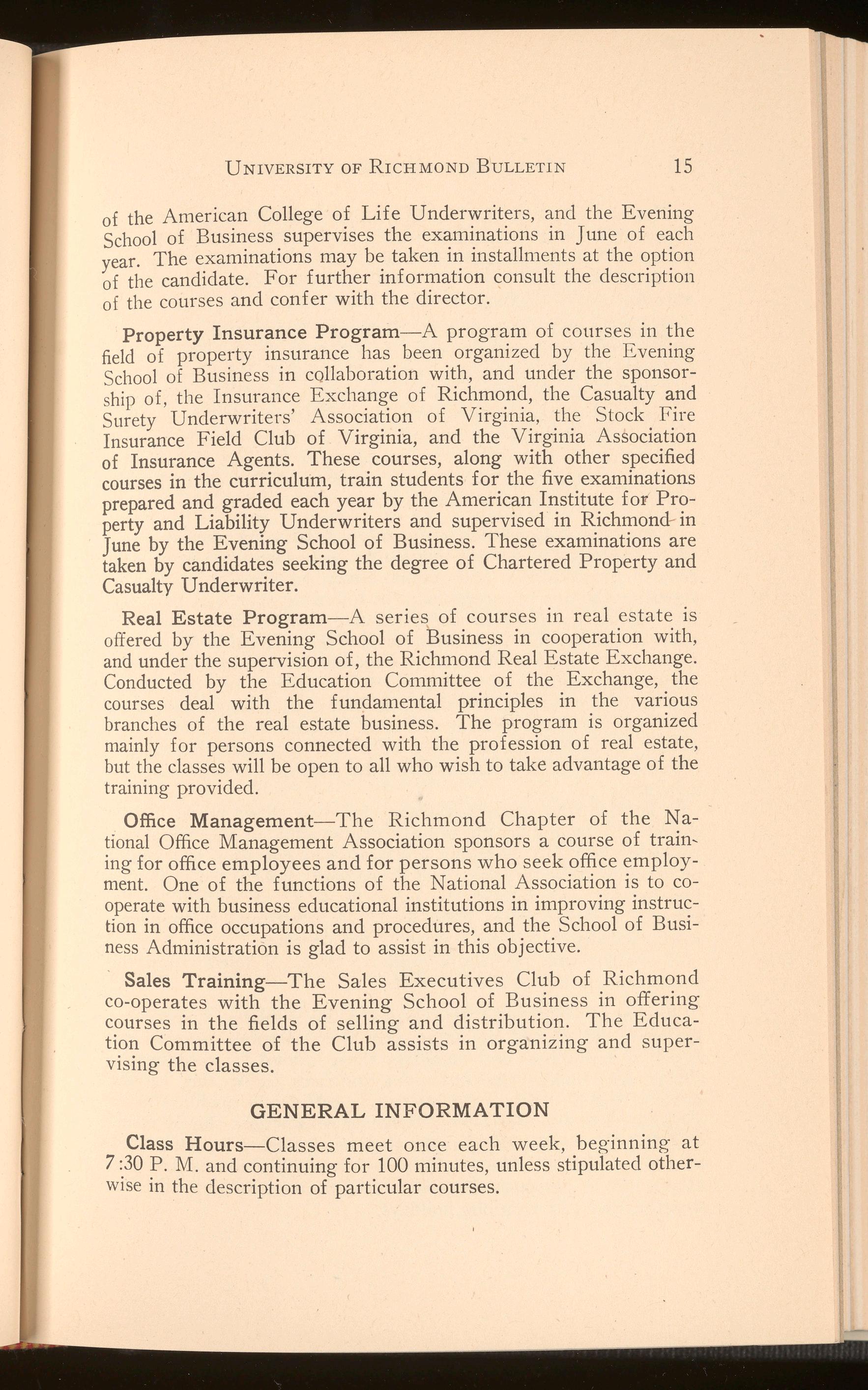
of the American College of Life Underwriters, and the Evening School of Business supervises the examinations in June of each year. The examinations may be taken in installments at the option of the candidate. For further information consult the description of the courses and confer with the director.
Property Insurance Program-A program of courses in the field of property insurance has been organized by the Evening School of Business in cQllaboration with, and under the sponsorship of, the Insurance Exchange of Richmond, the Casualty and Surety Underwriters' Association of Virginia, the Stock Fire Insurance Field Club of Virginia, and the Virginia Association of Insurance Agents. These courses, along with other specified courses in the curriculum, train students for the five examinations prepared and graded each year by the American Institute for Property and Liability Underwriters and supervised in Richmond-in June by the Evening School of Business. These examinations are taken by candidates seeking the degree of Chartered Property and CasualtyUnderwriter.
Real Estate Program-A series of courses in real estate is offered by the Evening School of Business in cooperation with, and under the supervision of, the Richmond Real Estate Exchange. Conducted by the Education Committee of the Exchange, the courses deal with the fundamental principles in the various branches of the real estate business. The program is organized mainly for persons connected with the profession of real estate, but the classes will be open to all who wish to take advantage of the training provided.
Office Management-The Richmond Chapter of the National Office Management Association sponsors a course of training for office employees and for persons who seek office employment. One of the functions of the National Association is to cooperate with business educational institutions in improving instruction in office occupations and procedures, and the School of Business Administration is glad to assist in this objective.
Sales Training-The Sales Executives Club of Richmond co-operates with the Evening School of Business in offering c?urses in the fields of selling and distribution. The Educah?l_l Committee of the Club assists in organizing and superv1smg the classes.
Class Hours-Classes meet once each week, beginning at 7 :_30!?·M. and continuing for 100 minutes, unless stipulated otherwise m the description of particular courses.
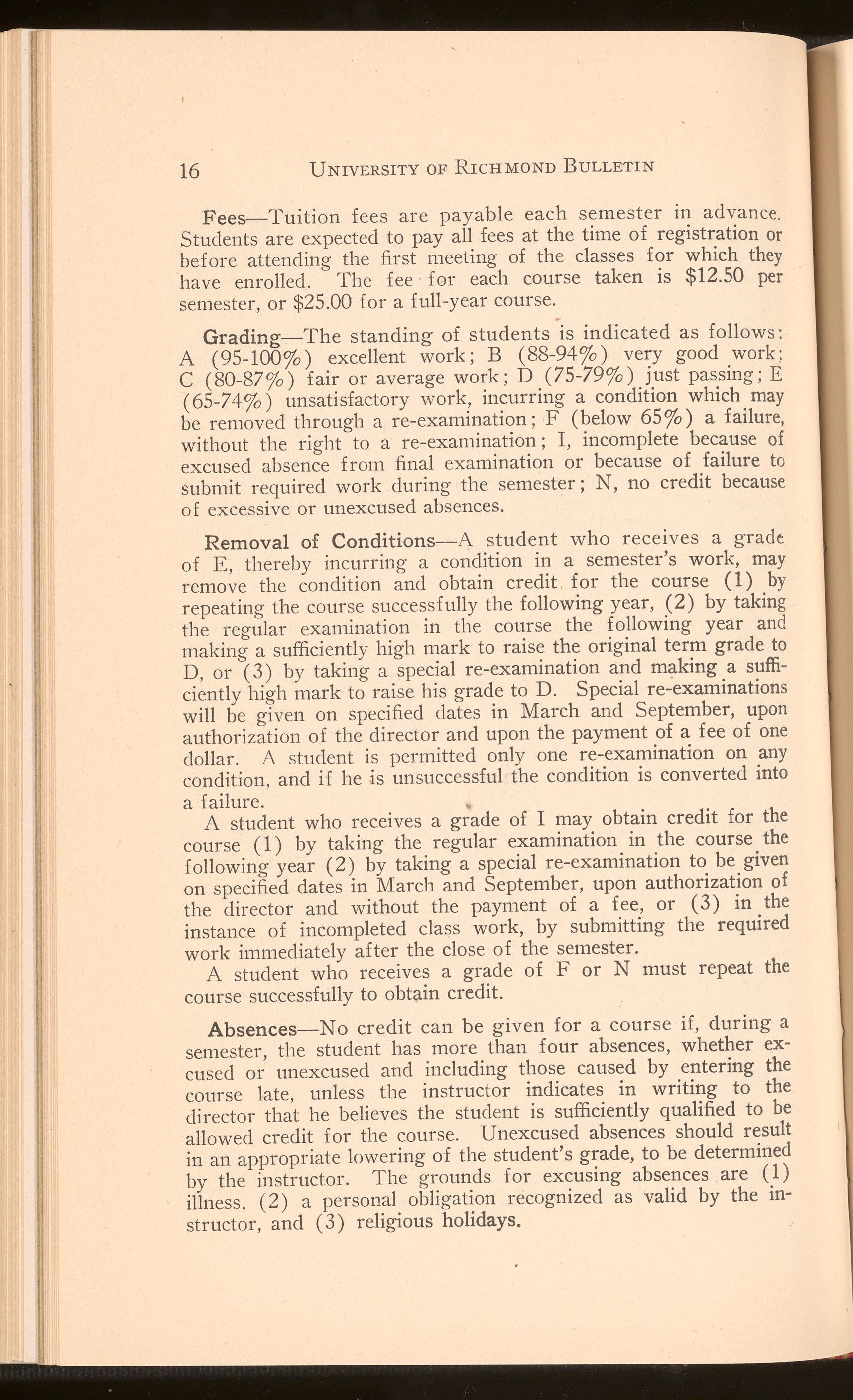
Fees-Tuition fees are payable each semester in advance. Students are expected to pay all fees at the time of registration or before attending the first meeting of the classes for which they have enrolled. The fee · for each course taken is $12.50 per semester, or $25.00 for a full-year course.
Grading-The standing of stud en ts is indicated as follows: A (95-100%) excellent work; B ( 88-94%) very good work; C (80-87%) fair or average work; D (75-79%) just passing; E ( 65-74%) unsatisfactory work, incurring a condition which may be removed through a re-examination; F (below 65%) a failure, without the right to a re-examination; I, incomplete because of excused absence from final examination or because of failure to submit required work during the semester; N, no credit because of excessive or unexcused absences.
Removal of Conditions-A student who receives a grade of E, thereby incurring a condition in a semester's work, may remove the condition and obtain credit for the course ( 1) by repeating the course successfully the following year, (2) by taking the regular examination in the course the following year and making a sufficiently high mark to raise the original term grade to D, or ( 3) by taking a special re-examination and making a sufficiently high mark to raise his grade to D. Special re-examinations will be given on specified elates in March and September, upon authorization of the director and upon the payment of a fee of one dollar. A student is permitted only one re-examination on any condition, and if he is unsuccessful the condition is converted into a failure.
A student who receives a grade of I may obtain credit for the course ( 1) by taking the regular examination in the course the following year (2) by taking a special re-examination to be given on specified dates in March and September, upon authorization of the director and without the payment of a fee, or ( 3) in the instance of incompleted class work, by submitting the required work immediately after the close of the semester.
A student who receives a grade of F or N must repeat the course successfully to obtain credit.
Absences-No credit can be given for a course if, during a semester, the student has more than four absences, whether excused or unexcused and including those caused by entering the course late, unless the instructor indicates in writing to the director that he believes the student is sufficiently qualified to be allowed credit for the course. Unexcused absences should result in an appropriate lowering of the student's grade, to be determined by the instructor. The grounds for excusing absences are ( 1) illness, (2) a personal obligation recognized as valid by the instructor, and ( 3) religious holidays.
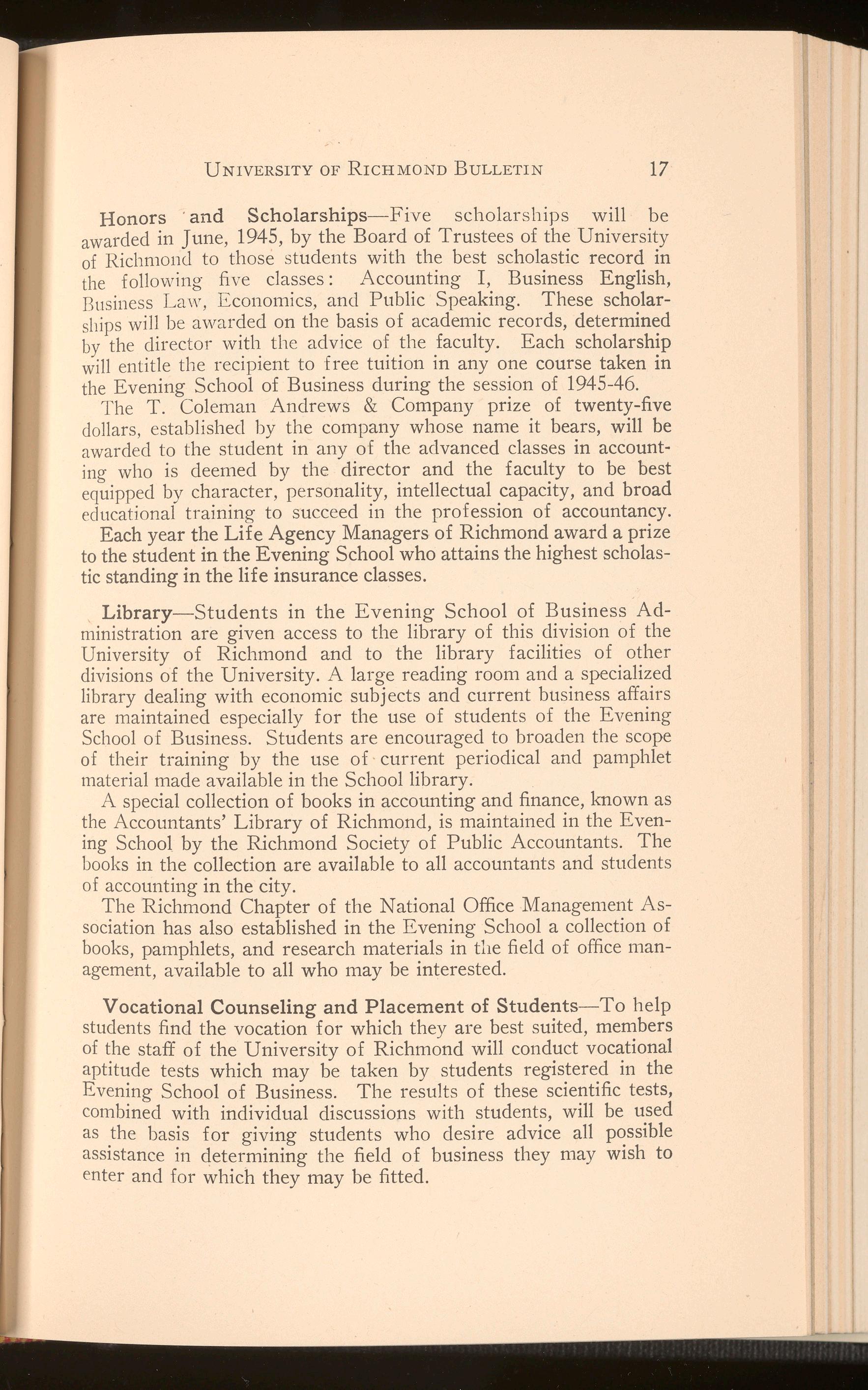
Honors ·and Scholarships-Five scholarships will be awarded in June, 1945, by the Board of Trustees of the University of Richmond to those students with the best scholastic record in the following fl\·e classes: Accounting I, Business English, Tittsiness La I\', Economics, and Public Speaking. These scholarships will be awarded on the basis of academic records, determined by the director with the advice of the faculty. Each scholarship will entitle the recipient to free tuition in any one course taken in the Evening School of Business during the session of 1945-46.
The T. Coleman Andrews & Company prize of twenty-five dollars, established by the company whose name it bears, will be awarded to the student in any o E the advanced classes in accounting who is deemed by the director and the faculty to be best equipped by character, personality, intellectual capacity, and broad educational training to succeed in the profession of accountancy.
Each year the Life Agency Managers of Richmond award a prize to the student in the Evening School who attains the highest scholastic standing in the life insurance classes.
Library-Students in the Evening School of Business Administration are given access to the library of this division of the University of Richmond and to the library facilities of other divisions of the University. A large reading room and a specialized library dealing with economic subjects and current business affairs are maintained especially for the use of students of the Evening School of Business. Students are encouraged to broaden the scope of their training by the use of current periodical and pamphlet material made available in the School library.
A special collection of books in accounting and finance, known as the Accountants' Library of Richmond, is maintained in the Evening School by the Richmond Society of Public Accountants. The books in the collection are available to all accountants and students of accounting in the city.
The Richmond Chapter of the National Office Management Association has also established in the Evening School a collection of books, pamphlets, and research materials in the field of office management, available to all who may be interested.
Vocational Counseling and Placement of Students-To help students find the vocation for which they are best suited, members of the staff of the University of Richmond will conduct vocational aptitude tests which may be taken by students registered in the Evening School of Business. The results of these scientific tests, combined with individual discussions with students, will be used as _the basis for giving students who desire advice all possible assistance in determining the field of business they may wish to enter and for which they may be fitted.
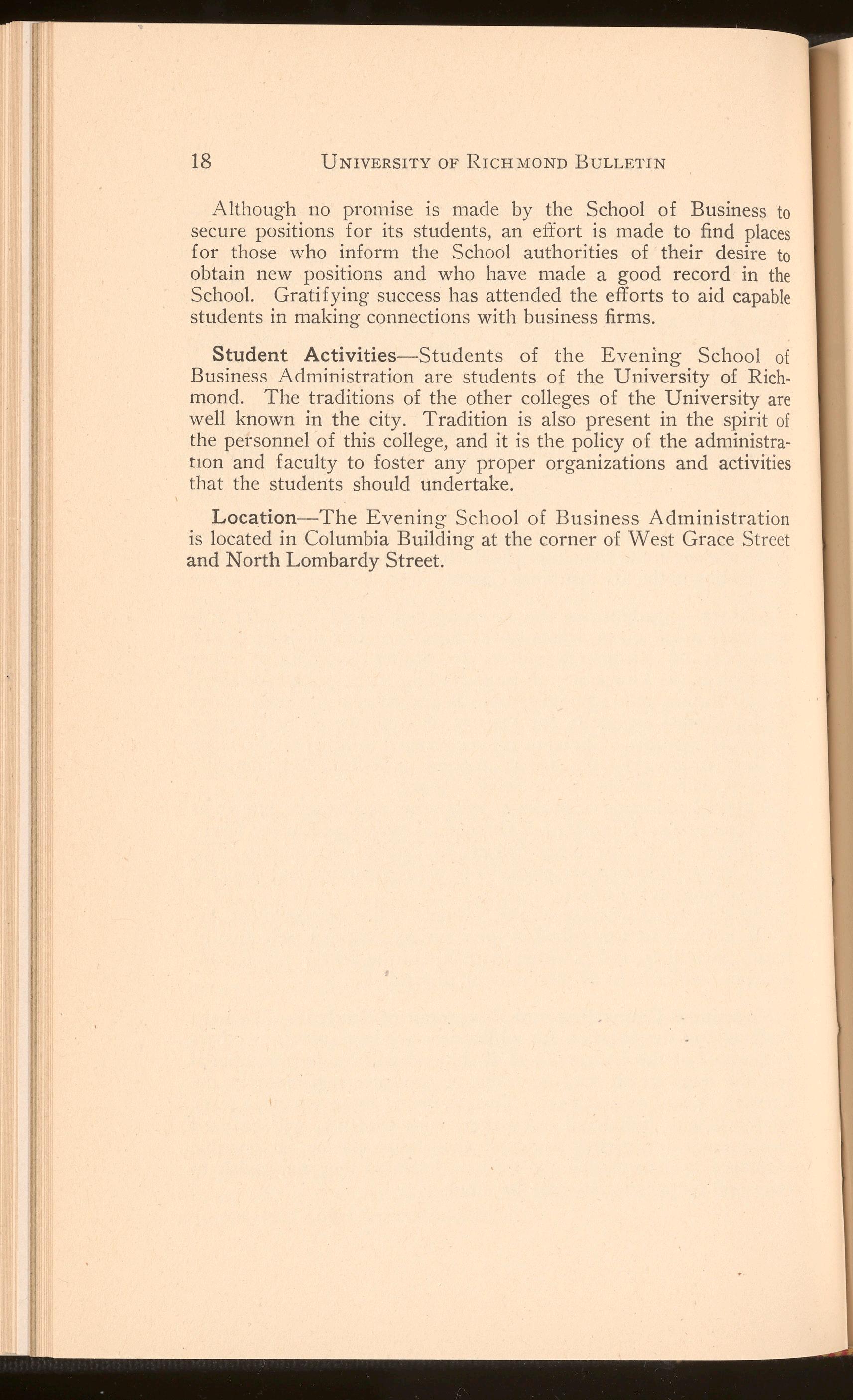
Although no promise is made by the School of Business to secure positions for its students, an effort is made to find places for those who inform the School authorities of their desire to obtain new positions and who have made a good record in the School. Gratifying success has attended the efforts to aid capable students in making connections with business firms.
Student Activities-Students of the Ev e ning School of Business Administration are students of the University of Richmond. The traditions of the other colleges of the University are well known in the city. Tradition is also present in the spirit of the personnel of this college, and it is the policy of the administrat10n and faculty to foster any proper organizations and activities that the students should undertake.
Location-The Evening School of Business Administration is located in Columbia Building at the corner of West Grace Str eet and North Lombardy Street.
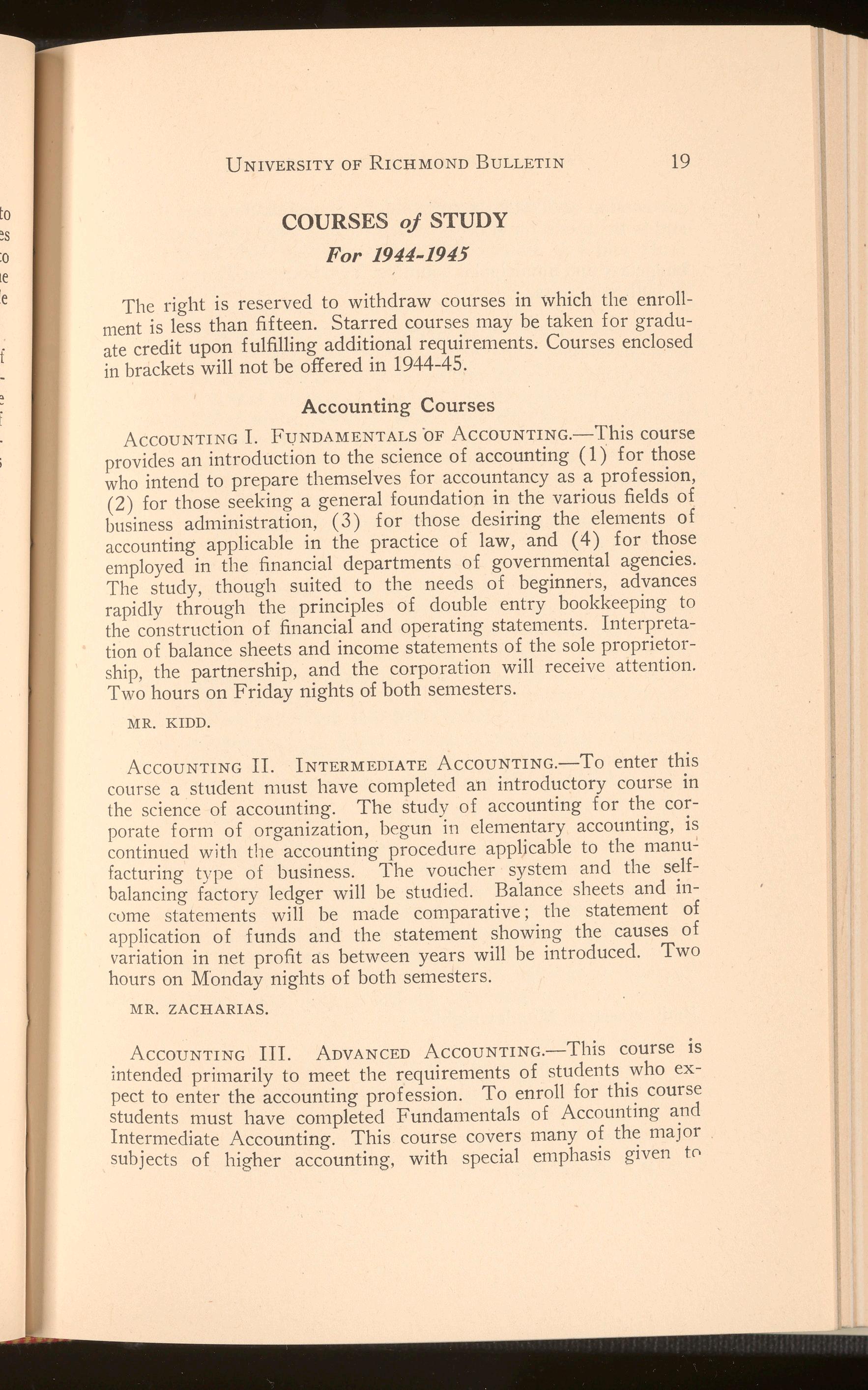
The right is reserved to withdraw courses in which the enrollment is less than fifteen. Starred courses may be taken for graduate credit upon fulfilling additional requirements. Courses enclosed in brackets will not be offered in 1944-45 .
AccouNTING I. FVNDAMENTALSoF AccouNTING.-This course provides an introduction to the science of accounting ( 1) for those who intend to prepare themselves for accountancy as a profession, (2) for those seeking a general foundation in the various fields of business administration, ( 3) for those desiring the elements of accounting applicable in the practice of law, and ( 4) for those employed in the financial departments of governmental agencies. The study, though suited to the needs of beginners, advances rapidly through the principles of double entry bookkeeping to the construction of financial and operating statements. Interpretation of balance sheets and income statements of the sole proprietorship, the partnership, and the corporation will receive attention. Two hours on Friday nights of both semesters.
MR. KIDD.
AccouNTING II. INTERMEDIATEAccouNTING.-To enter this course a student must have completed an introductory course in the science of accounting. The study of accounting for the corporate form of organization, begun in elementary accounting, is continued with the accounting procedure applicable to the manufacturing type of business. The voucher system and the selfbalancing factory ledger will be studied. Balance sheets and incurne statements will be made comparative; the statement of application of funds and the statement showing the causes of variation in net profit as between years will be introduced. Two hours on Monday nights of both semesters.
MR. ZACHARIAS.
AccouNTING III. ADVANCEDAccouNTING.-This course is intended primarily to meet the requirements of students who expect to enter the accounting profession. To enroll for this course students must have completed Fundamentals of Accounting and Intermediate Accounting. This course covers many of the major subjects of higher accounting, with special emphasis given t0
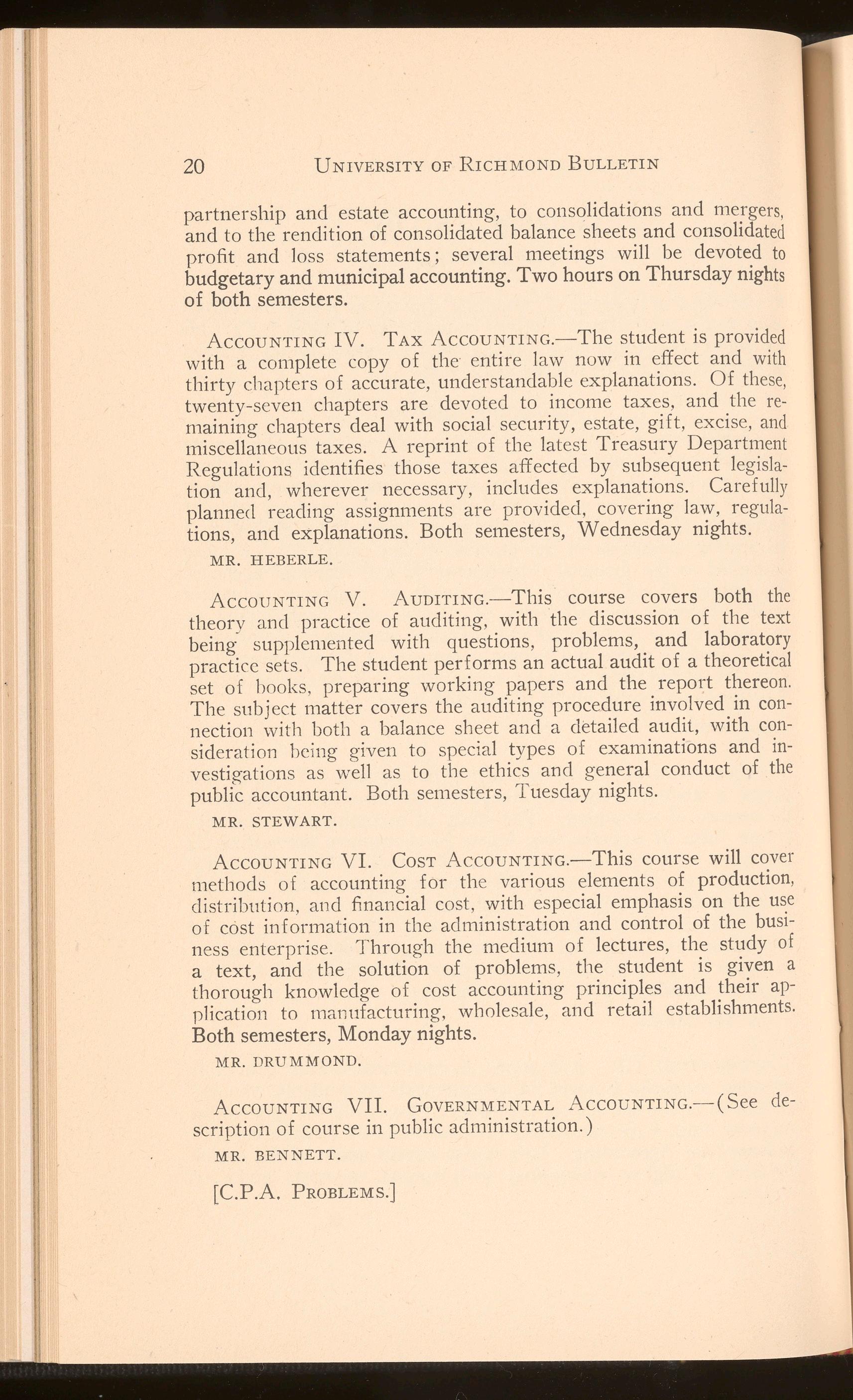
partnership and estate accounting, to consolidations and mergers, and to the rendition of consolidated balance sheets and consolidated profit and loss statements; several meetings will be devoted to budgetary and municipal accounting. Two hours on Thursday nights of both semesters.
AccouNTING IV. TAX AccouNTING.-The student is provided with a complete copy of the entire law now in effect and with thirty chapters of accurate, understandable explanations. Of these, twenty-seven chapters are devoted to income taxes, and the remaining chapters deal with social security, estate, gift, excise, and miscellaneous taxes. A reprint of the latest Treasury Department Regulations identifies those taxes affected by subsequent legislation and, wherever necessary, includes explanations. Carefully planned reading assignments are provided, covering law, regulations, and explanations. Both semesters, Wednesday nights.
MR. HEBERLE.
AccouNTING V. AuDITING.-This course covers both the theory and practice of auditing, with the discussion of the text being supplemented with questions, problems, and laboratory practice sets. The student performs an actual audit of a theoretical set of hooks. preparing working papers and the report thereon. The subject matter covers the auditing procedure involved in connection with both a balance sheet and a detailed audit, with consideration being given to special types of examinations and investigations as well as to the ethics and general conduct of the public accountant. Both semesters, Tuesday nights.
MR. STEWART.
AccouNTING VI. CosT AccOUNTING.-This course will cover methods of accounting for th e various elements of production, distribution, and financial cost, with especial emphasis on the use of cost in formation in the administration and control of the business enterprise. Through the medium of lectures, the study of a text, and the solution of problems, the student is given a thorough knowledge of cost accounting principles and their application to manufacturing, wholesale, and retail establishments. Both semesters, Monday nights.
MR. DRUMMOND.
AccouNTING VII. GOVERNMENTALAccouNTING.-( See description of course in public administration.)
MR. BENNETT.
[C.P.A. PROBLEMS.]
Courses in Public Administration
[*PRINCIPLES OF PUBLIC ADMINISTRATION.]
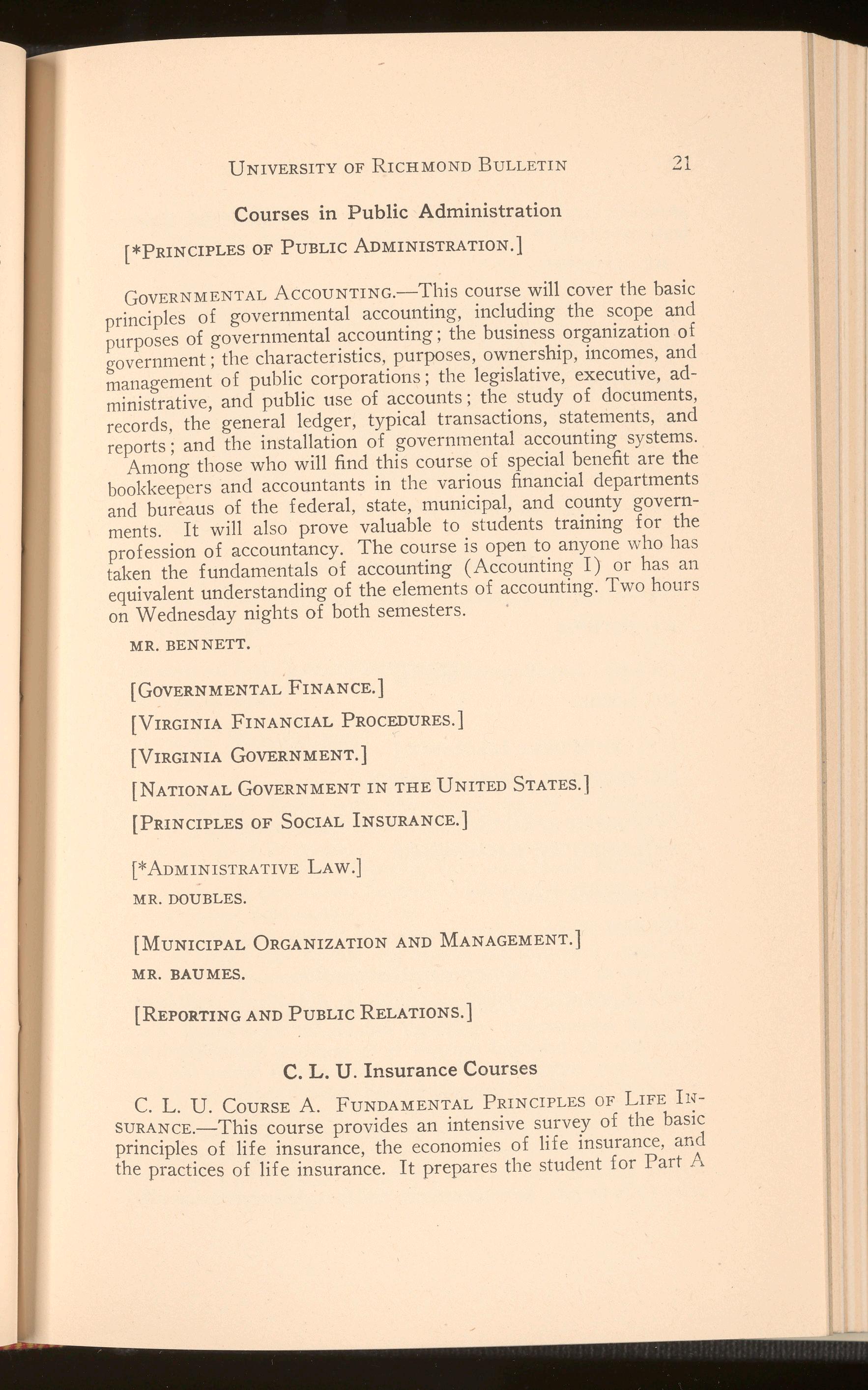
21
GovERNMENTALAccouNTING.-This course will cover the basic principles of governmental accounting, including the scope and purposes of governmental accounting; the business organization of government; the characteristics, purposes, ownership, incomes, and management of public corporations; the legislative, executive, administrative, and public use of accounts; the study of documents, records, the general ledger, typical transactions, statements, and reports ; and the installation of governmental accounting systems.
Among those who will find this course of special benefit are the bookkeepers and accountants in the various financial departments and bureaus of the federal, state, municipal, and county governments. It will also prove valuable to students training for the profession of accountancy. The course is open to anyone who has taken the fundamentals of accounting ( Accounting I) or has an equivalent understanding of the elements of accounting. Two hours on Wednesday nights of both semesters.
MR. BENNETT.
[GOVERNMENTALFINANCE.]
[VIRGINIA FINANCIAL PROCEDURES.]
[VIRGINIA GOVERNMENT.]
[NATIONAL GOVERNMENTIN THE UNITED STATES.]
[PRINCIPLES OF SOCIAL INSURANCE.]
[*ADMINISTRATIVELAW.]
MR. DOUBLES.
[MUNICIPAL ORGANIZATIONAND MANAGEMENT.]
MR. BAUMES.
[REPORTINGAND PUBLIC RELATIONS.]
C. L. u. COURSE A. FUNDAMENTAL PRINCIPLES OF LIFE IHSURANCE.-This course provides an intensive survey of the basic principles of life insurance, the economies of life insurance, and the practices of life insurance. It prepares the student for Part A
of the C. L. U. examinations. Two hours on Thursday nights of both semesters.
MR. HAWKINS.
[C. L. u. COURSEB. GENERAL INSURANCE EDUCATION.)
[C.L.U. COURSE C. LIFE INSURANCE LAW.]
MR. SCOTT.
[C. L. u. COURSE D. LIFE INSURANCE FINANCE.]
MR. MCNEILL.
[C. L. U. C_OURSEE. LIFE UNDERWRITING.)
Property Insurance Courses
[PRINCIPLES OF CASUALTY INSURANCE]
MR. JOHNSON.
[FIDELITY AND SURETY BONDS]
MR. CURTIS.
(INLAND MARINE INSURANCE.]
MR. COULBOURNAND MR. GOODRIDGE.
[PRINCIPLES oF FIRE INSURANCE AND ALLIED LrnEs. l
MR. SPEIGHT AND MR. GOODRIDGE.
[INSURANCE LAW.]
MR.. MAY.
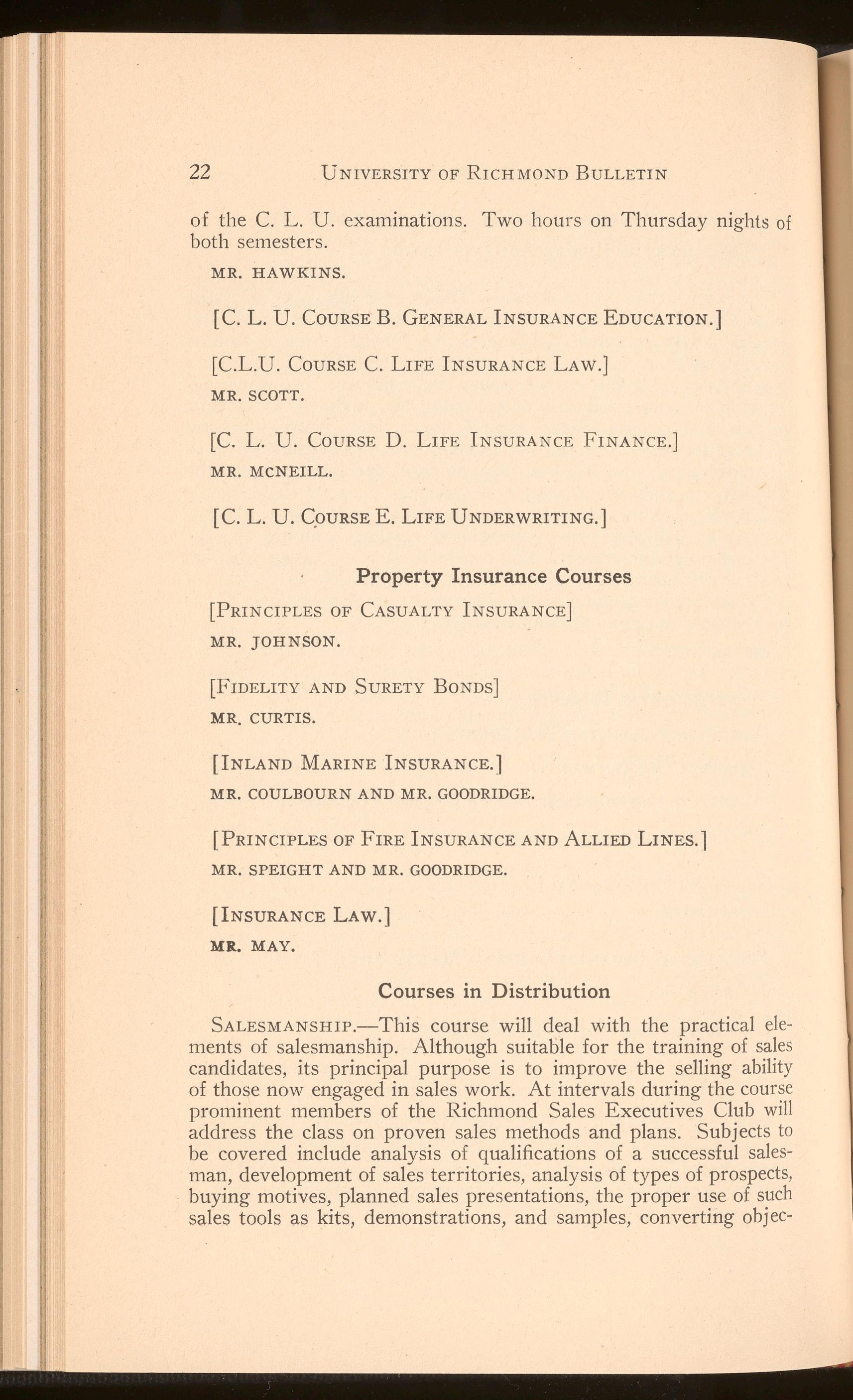
Courses in Distribution
SALESMANSHIP.-This course will deal with the practical elements of salesmanship. Although suitable for the training of sales candidates, its principal purpose is to improve the selling ability of those now engaged in sales work. At intervals during the course prominent members of the Richmond Sales Executives Club will address the class on proven sales methods and plans. Subjects to be covered include analysis of qualifications of a successful salesman, development of sales territories, analysis of types of prospects, buying motives, planned sales presentations, the proper use of such sales tools as kits, demonstrations, and samples, converting objec-
tions into sales opportunities, handling complaints, and after-thesale selling. Two hours on Monday nights of the first semester. Tuition, $15.00.
MR.BRYAN.
ADVERTISING.-This course covers modern principles of advertising as they relate to local and national advertising. Special attention is directed to the study and preparation of local advertising, with emphasis on copy, layout, and general typography. All classes of advertising media are treated, including magazine, newspaper, trade paper, billboard, radio, and direct mail. Field trips are made to advertising offices, newspaper plants, outdoor advertising plants, printing establishments, and radio stations. Both semesters, Tuesday nights.
MR.HALL.

[PRINCIPLESOF REAL ESTATE.]
MR.THALHIMER.
[PRACTICALREAL ESTATEAPPRAISAL.]
MR. THALHIMER.
[PROPERTYMANAGEMENT.]
THE LAW OF REAL AND PERSONALPROPERTY.-M'ethods of acquiring property-deeds, wills, inheritance, statute of limitations, gifts, etc.; estates created-fee simple, life, term of years, etc.; co-tenancy-joint, in common, co-parcenary, and entirety; lienscommon law, mechanics, judgment, etc.; incorporeal interests in land-profit and easements ; licenses ; kmdlord and tenant; building restrictions; examination of title.
This course is of special importance to those whose work concerns real estate-the realtor, the broker, the insurance agent, the manager of an estate. Every business man, however, should have a. knowledge of the law of property. Both semesters, Tuesday mghts.
MR.HERRINK.
[SCIENTIFIC MANAGEME:WT.]
MR. DAVENPORT.
[OFFICE MANAGEMENT.]
[PERSONNELRELATIONSIN BUSINESS.]
MR. ENTWISTLE,
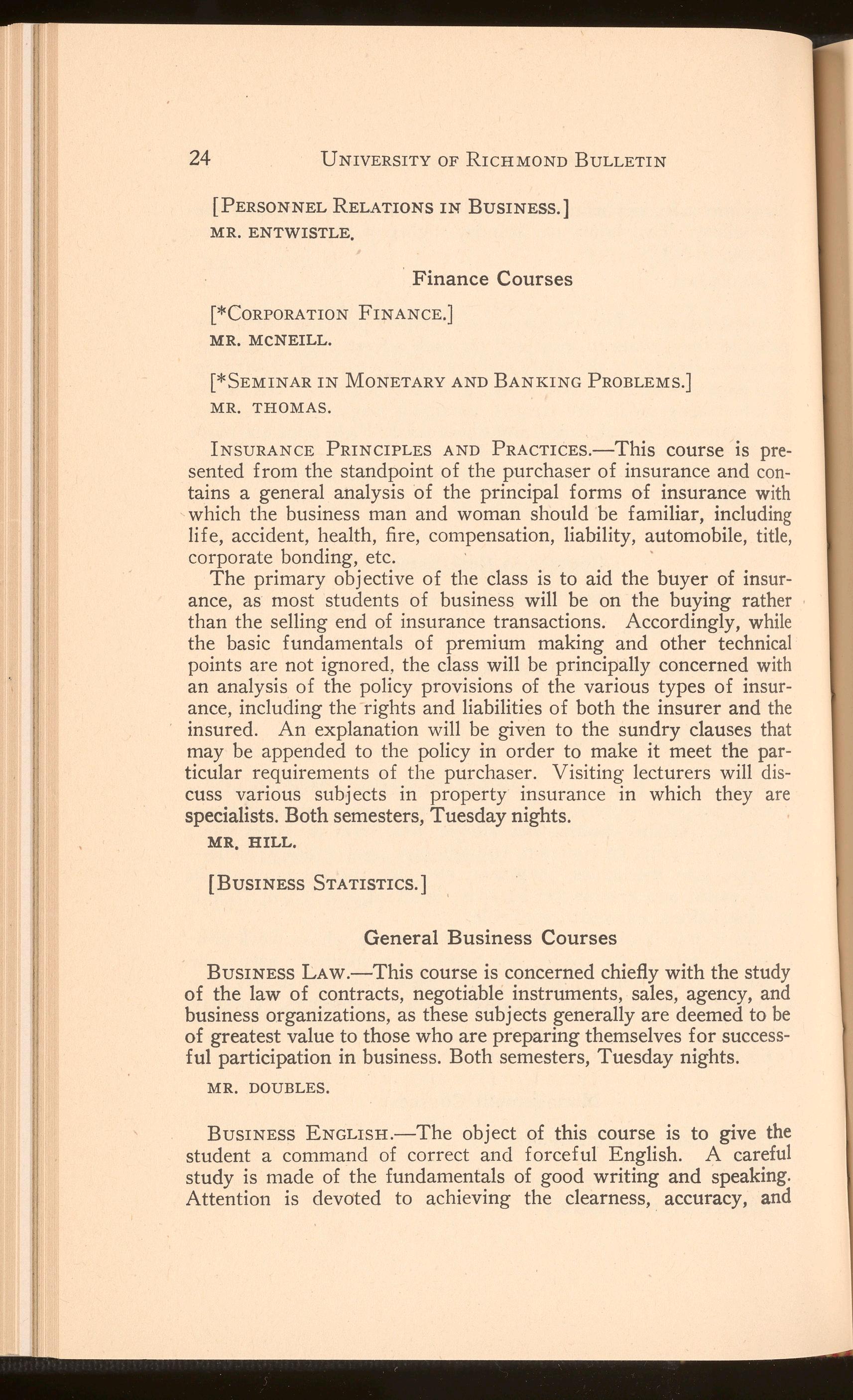
· Finance Courses
[*CORPORATIONFINANCE.]
MR. MCNEILL.
[*SEMINARIN MONETARYANDBANKINGPROBLEMS.]
MR. THOMAS.
INSURANCEPRINCIPLES AND PRACTICEs.-This course is presented from the standpoint of the purchaser of insurance and contains a general analysis of the principal forms of insurance with which the business man and woman should be familiar, including life, accident, health, fire, compensation, liability, automobile, title, corporate bonding, etc. ·
The primary objective of the class is to aid the buyer of insurance, as most students of business will be on the buying rather than the selling end of insurance transactions. Accordingly, while the basic fundamentals of premium making and other technical points are not ignored, the class will be principally concerned with an analysis of the policy provisions of the various types of insurance, including the rights and liabilities of both the insurer and the insured. An explanation will be given to the sundry clauses that may be appended to the policy in order to make it meet the particular requirements of the purchaser. Visiting lecturers will discuss various subjects in property insurance in which they are specialists. Both semesters, Tuesday nights.
MR, HILL.
[BUSINESS STATISTICS.]
General Business Courses
BUSINESSLAw.-This course is concerned chiefly with the study of the law of contracts, negotiable instruments, sales, agency, and business organizations, as these subjects generally are deemed to be of greatest value to those who are preparing themselves for successful participation in business. Both semesters, Tuesday nights.
MR. DOUBLES.
BusINESS ENGLISH.-The object of this course is to give the student a command of correct and forceful English. A careful study is made of the fundamentals of good writing and speaking. Attention is devoted to achieving the clearness, accuracy, and
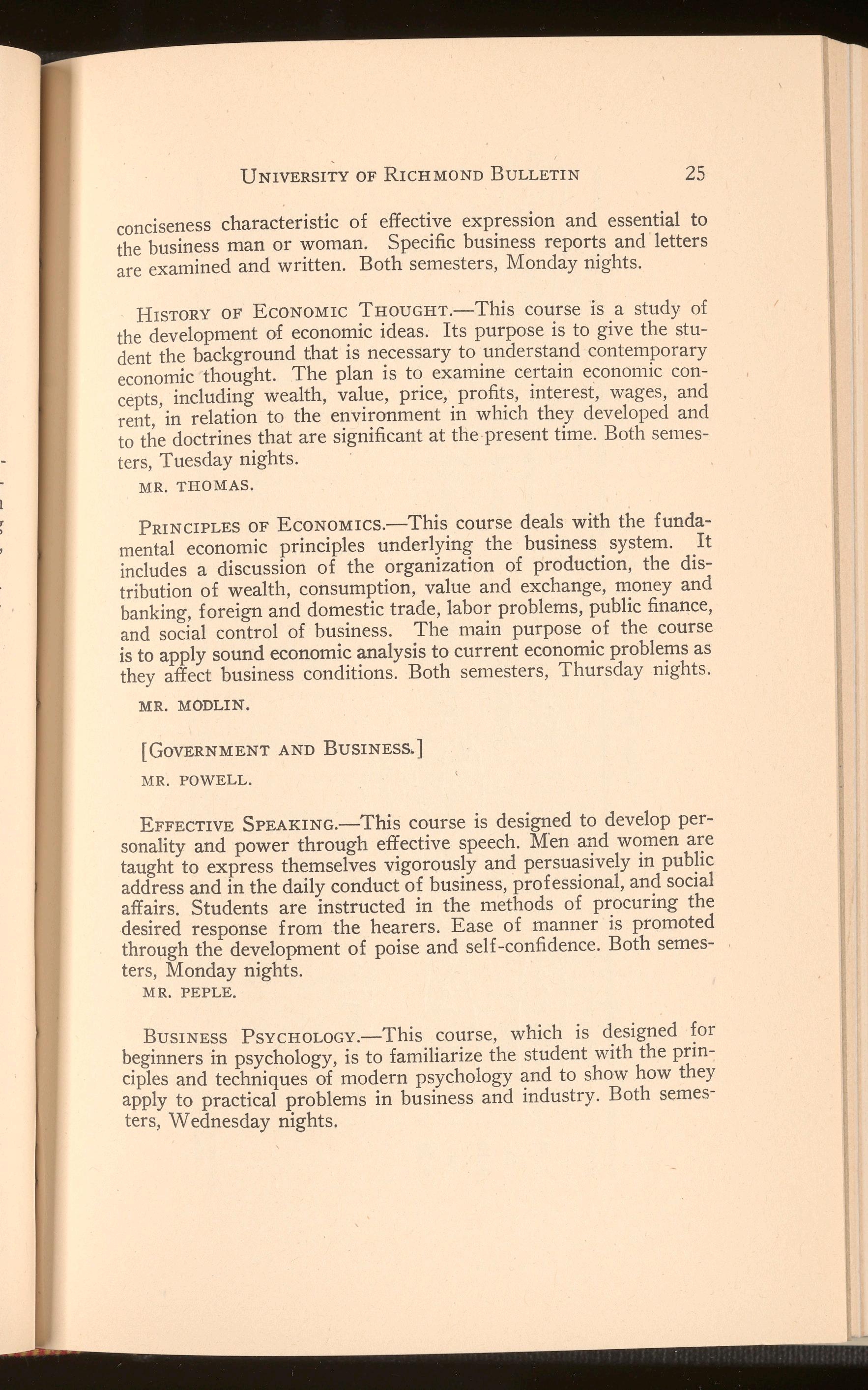
conciseness characteristic of effective expression and essential to the business man or woman. Specific business reports and letters are examined and written. Both semesters, Monday nights.
HISTORYOF EcoNOMIC THOUGHT.-This course is a study of the development of economic ideas. Its purpose is to give the student the background that is necessary to understand contemporary economic thought. The plan is to examine certain economic concepts, including wealth, value, price, profits, interest, wages, and rent, in relation to the environment in which they developed and to the doctrines that are significant at the present time. Both semesters, Tuesday nights.
MR. THOMAS.
PRINCIPLESOF EcoNOMICs.-This course deals with the fundamental economic principles underlying the business system. It includes a discussion of the organization of production, the distribution of wealth, consumption, value and exchange, money and banking, foreign and domestic trade, labor problems, public finance, and social control of business. The main purpose of the course is to apply sound economic analysis to current economic problems as they affect business conditions. Both semesters, Thursday nights.
MR. MODLIN.
MR.POWELL.
EFFECTIVESPEAKING.-This course is designed to develop personality and power through effective speech. Men and women are taught to express themselves vigorously and persuasively in public address and in the daily conduct of business, professional, and social affairs. Students are instructed in the methods of procuring the desired response from the hearers. Ease of manner is promoted through the development of poise and self-confidence. Both semesters, Monday nights.
MR.PEPLE.
BUSINESS PsYCHOLOGY.-This course, which is designed for beginners in psychology, is to familiarize the student with the principles and techniques of modern psychology and to show how they apply to practical problems in business and industry. Both semesters, Wednesday nights.
Class Schedule, 1944-45
FRIDAY
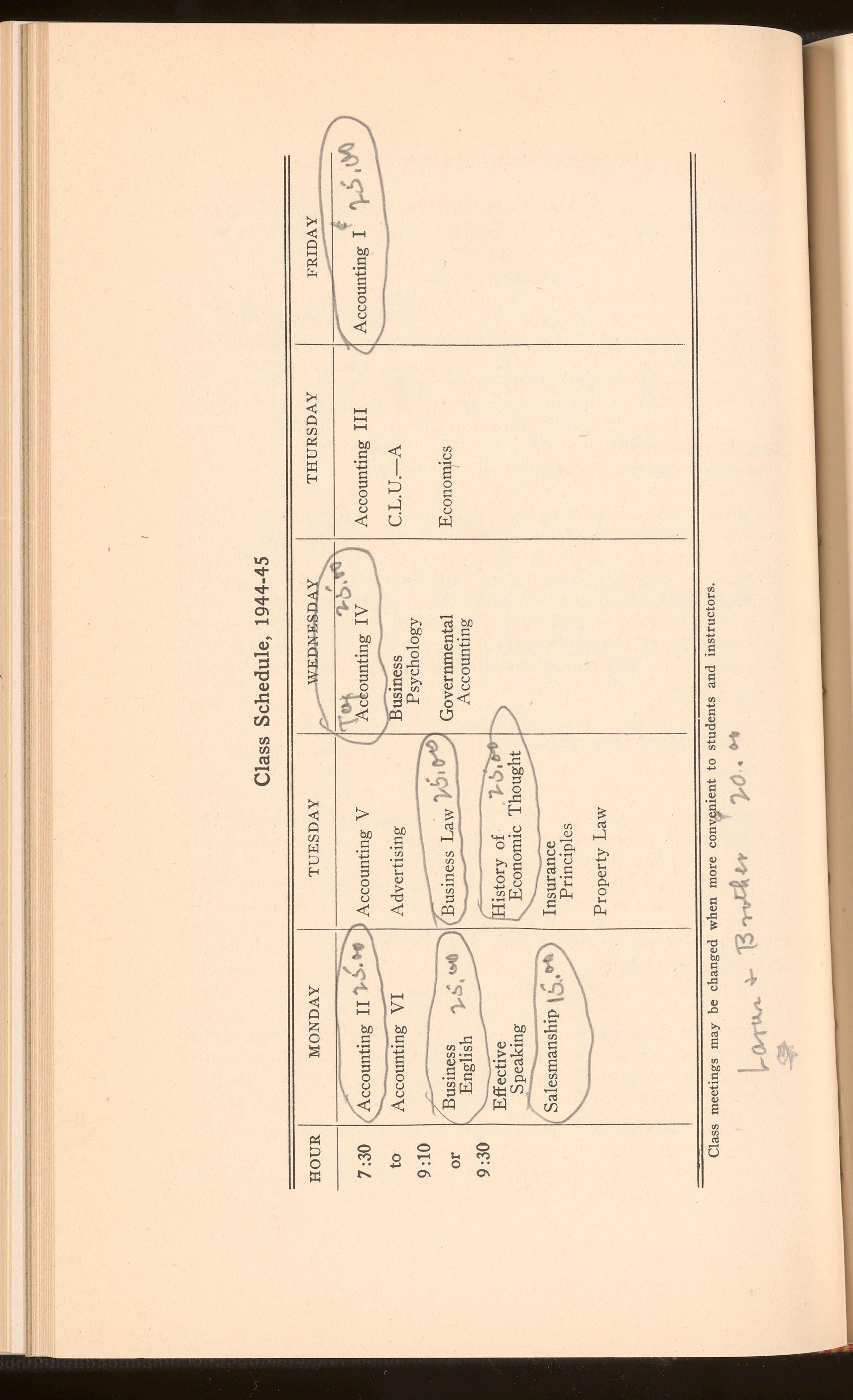
THURSDAY
Business Psychology Governmental Accounting
TUESDAY Property Law
MONDAY
HOUR 7:30 to 9:10 or 9:30
Class meetings may be changed when more conv~nient to students and instructors.
194
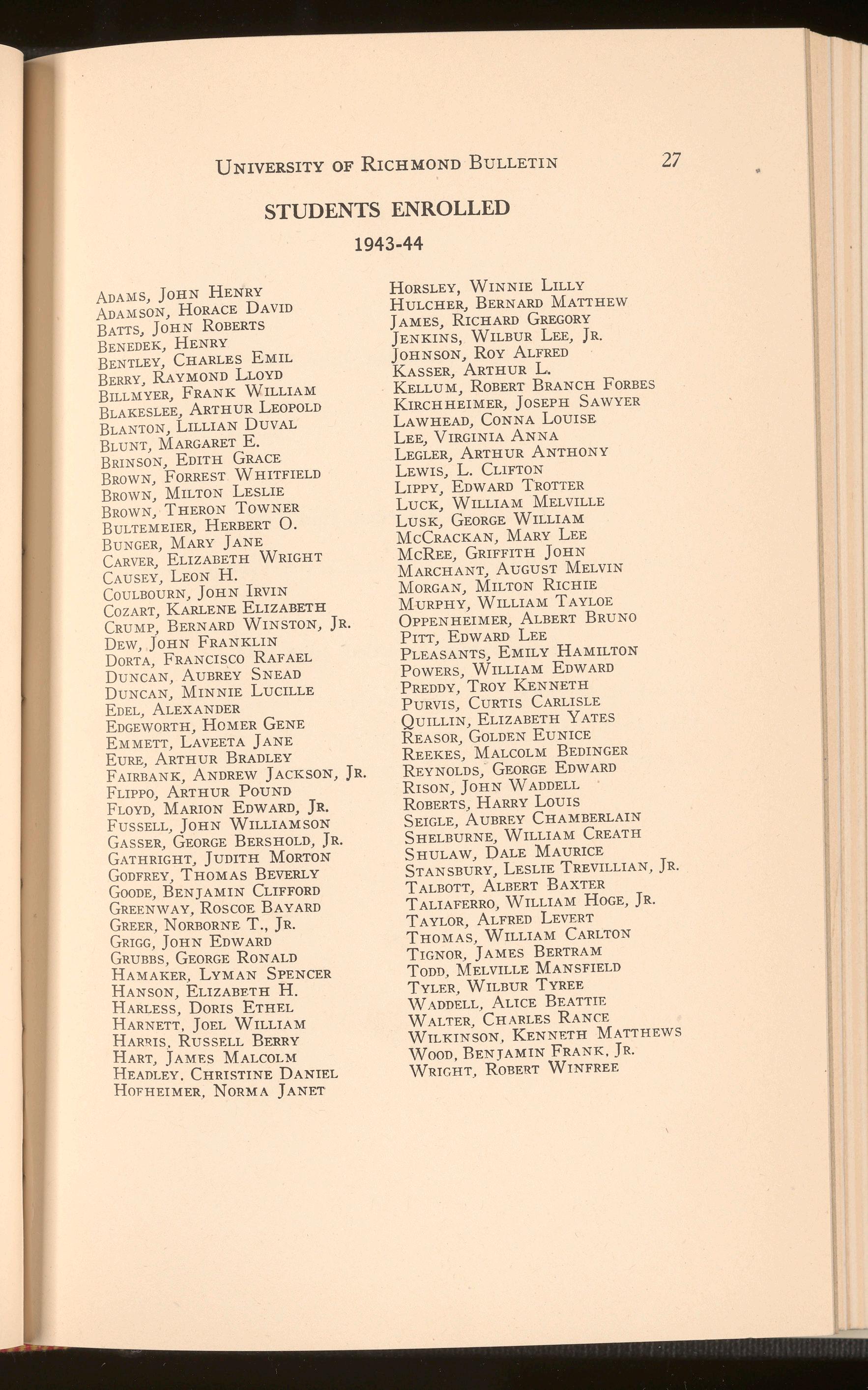
ADAMS, JOHN HENRY
ADAMSON, HORACE DAVID
BAITS, JOHN ROBERTS
BENEDEK, HENRY
BENTLEY, CHARLES EMIL
BERRY, RAYMOND UOYD
BILLMYER, FRANK WILLIAM
BLAKESLEE, ARTHUR LEOPOLD
BLANTON, LILLIAN DUVAL
BLUNT, MARGARET E.
BRINSON, EDITH GRACE
BROWN, FORREST WHITFIELD
BROWN, MILTON LESLIE
BROWN, THERON TOWNER
BULTEMEIER, HERBERT 0. BUNGER, MARY JANE
CARVER, ELIZABETH WRIGHT
CAUSEY, LEON H.
CouLBOURN, JOHN IRVIN
(OZART, KARLENE ELIZABETH
(RUMP, BERNARD WINSTON, JR.
DEW, JOHN FRANKLIN
DORTA, FRANCISCO RAFAEL
DUNCAN, AUBREY SNEAD
DUNCAN, MINNIE LUCILLE
EDEL, ALEXANDER
EDGEWORTH, HOMER GENE EMMEIT, LAVEETA JANE
EuRE, ARTHUR BRADLEY
FAIRBANK, ANDREW JACKSON, JR.
FLIPPO, ARTHUR POUND
FLOYD, MARION EDWARD, JR. FUSSELL, JOHN WILLIAMSON
GASSER, GEORGE BERSHOLD, JR. GATHRIGHT, JUDITH MORTON GODFREY, THOMAS BEVERLY
GOODE, BENJAMIN CLIFFORD GREENWAY, ROSCOE BAYARD
GREER, NORBORNE T., JR. GRIGG, JOHN EDWARD GRUBBS, GEORGE RONALD HAMAKER, LYMAN SPENCER HANSON, ELIZABETH H. HARLESS, DORIS ETHEL HARNETT, JOEL WILLIAM HAR'I\IS. RUSSELL BERRY HART, JAMES MALCOLM HEADLEY. CHRISTINE DANIEL HOFHEIMER, NORMA JANET
HORSLEY, WINNIE LILLY HULCHER, BERNARD MAITHEW JAMES, RICHARD GREGORY JENKINS, WILBUR LEE, ]R. JOHNSON, ROY ALFRED
KASSER, ARTHUR L
KELLUM, ROBERT BRANCH FORBES
KIRCHHEIMER, JOSEPH SAWYER
LAWHEAD, CONNA LOUISE
LEE, VIRGINIA ANNA
LEGLER, ARTHUR ANTHONY
LEWIS, L. CLIFTON
LIPPY, EDWARD TROTTER
LUCK, WILLIAM MELVILLE
LUSK, GEORGE WILLIAM
McCRACKAN, MARY LEE
McREE, GRIFFITH JoHN
MARCHANT, AUGUST MELVIN
MORGAN, MILTON RICHIE
MURPHY, WILLIAM TAYLOE
OPPENHEIMER, ALBERT BRUNO
PITT, EDw ARD LEE
PLEASANTS, EMILY HAMILTON
POWERS, WILLIAM EDWARD
PREDDY, TROY KENNETH
PURVIS, CURTIS CARLISLE
QUILLIN, ELIZABETH YATES
REASOR, GOLDEN EUNICE
REEKES, MALCOLM BEDINGER
REYNOLDS, GEORGE EDWARD
RISON, JOHN WADDELL
ROBERTS, HARRY LOUIS
SEIGLE, AUBREY CHAMBERLAIN
SHELBURNE, WILLIAM CREATH
SHULAW, DALE MAURICE
STANSBURY, LESLIE TREVILLIAN, JR.
TALBOTT, ALBERT BAXTER
TALIAFERRO, WILLIAM HOGE, JR.
TAYLOR, ALFRED LEVERT
THOMAS, WILLIAM CARLTON
TIGNOR, JAMES BERTRAM
TODD, MELVILLE MANSFIELD
TYLER, WILBUR TYREE
WADDELL, ALICE BEATTIE
WALTER, CHARLES RANCE
WTLKINSON, KENNETH MATTHEWS
Woon, BENJAMIN FRANK, JR.
WRTGH T, ROBERT WINFREE
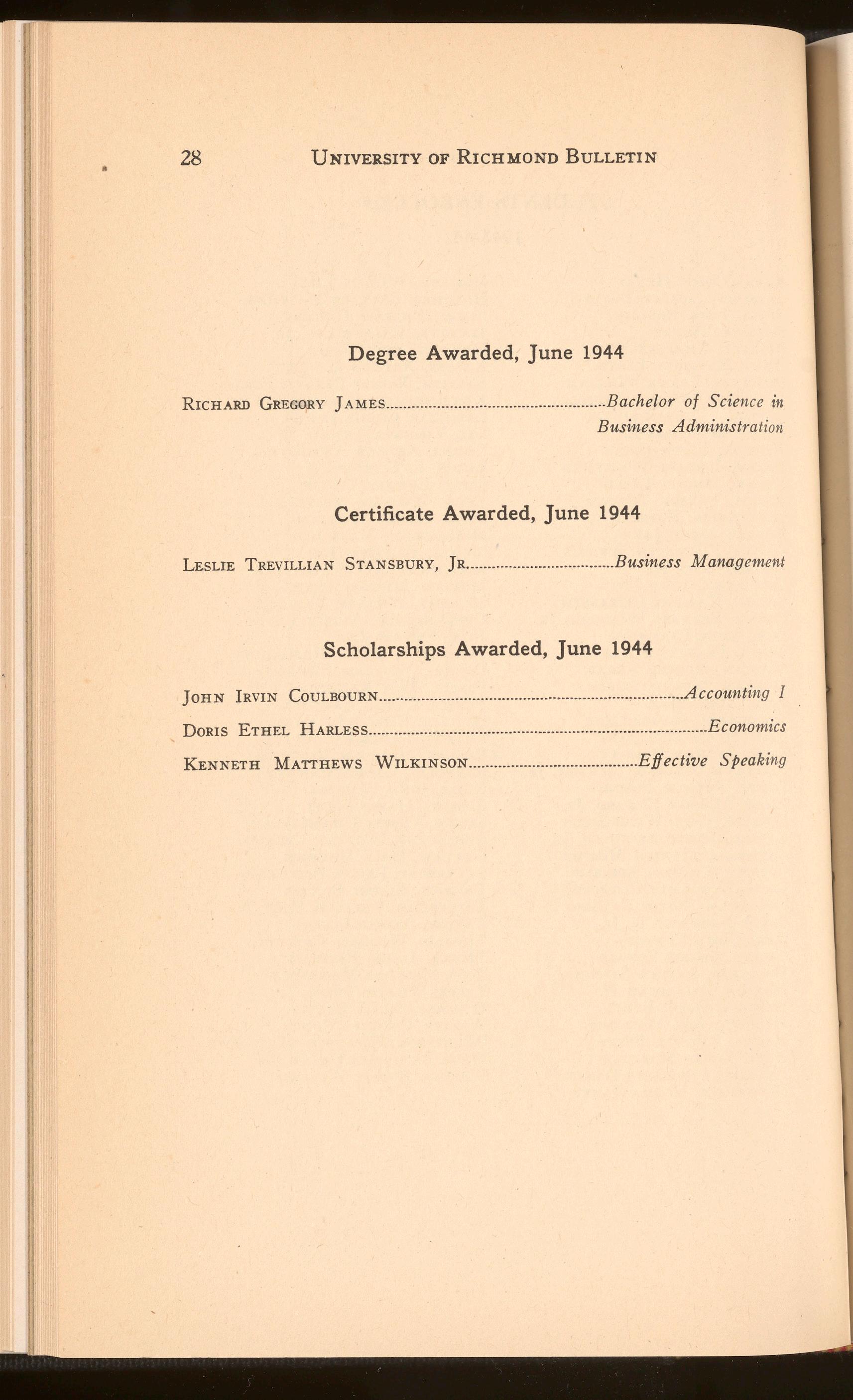
Degree Awarded, June 1944
RICHARD GREGORY J AMES ..................•..........•.. Bachelor of Science in Business Administration
Certificate Awarded, June 1944
LESLIE TREVILLIAN STANSBURY, ]R...................................Business Management
Scholarships Awarded, June 1944
JoHN IRVIN CouLBOURN ..... Accounting I
DORIS ETHEL HARLESS
KENNETH MATTHEWS WILKINSON Effective Speaking



